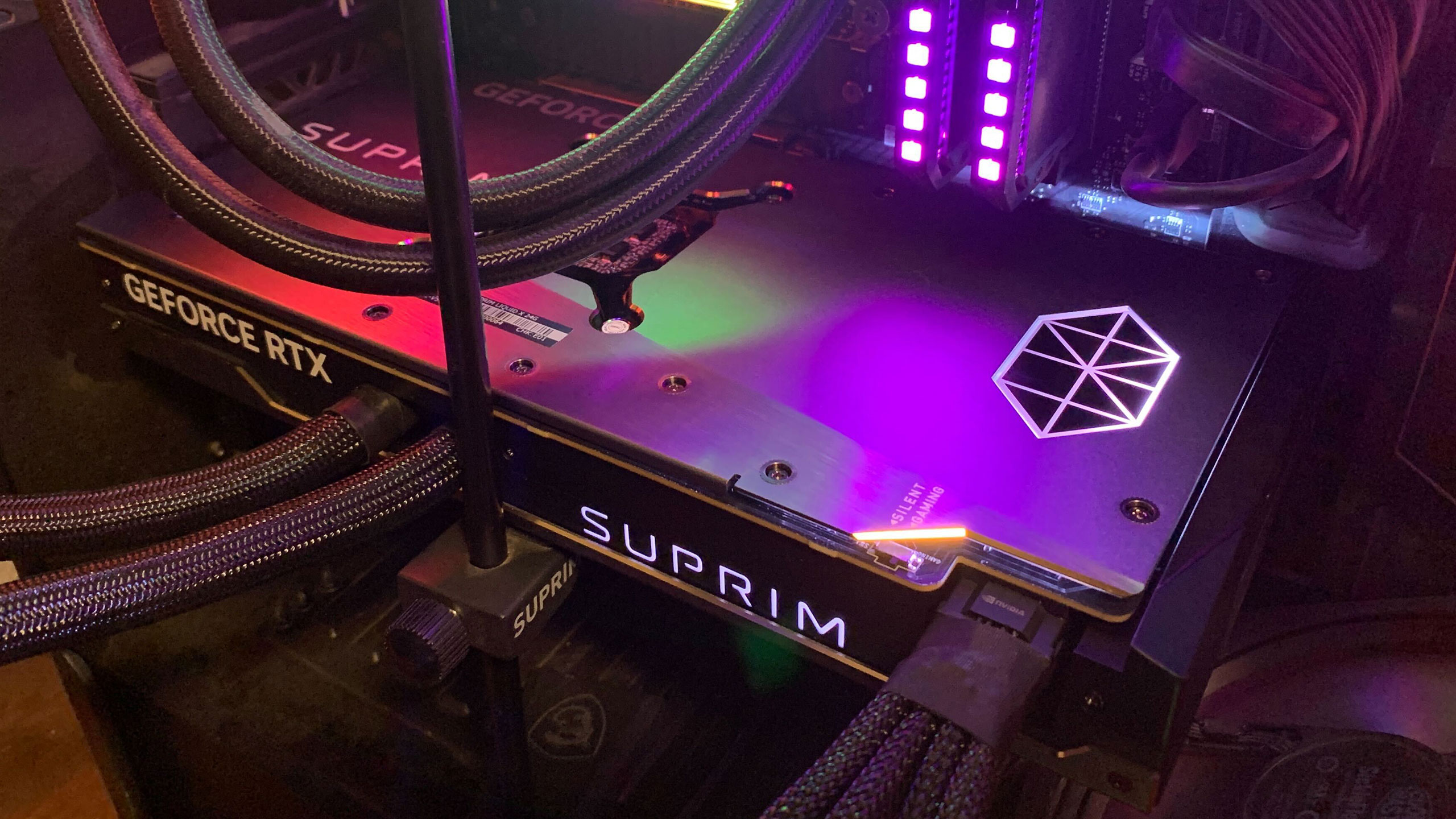Why you can trust Tom's Hardware
4K Gaming Performance
Our gaming tests consist of a "standard" suite of eight games without ray tracing enabled (even if the game supports it), and a separate "ray tracing" suite of six games that all use multiple RT effects. We've already tested the RTX 4090 Founders Edition at 1080p, and found that it's generally overkill at such settings. For the AIB cards, we'll focus on the 4K and 1440p performance.
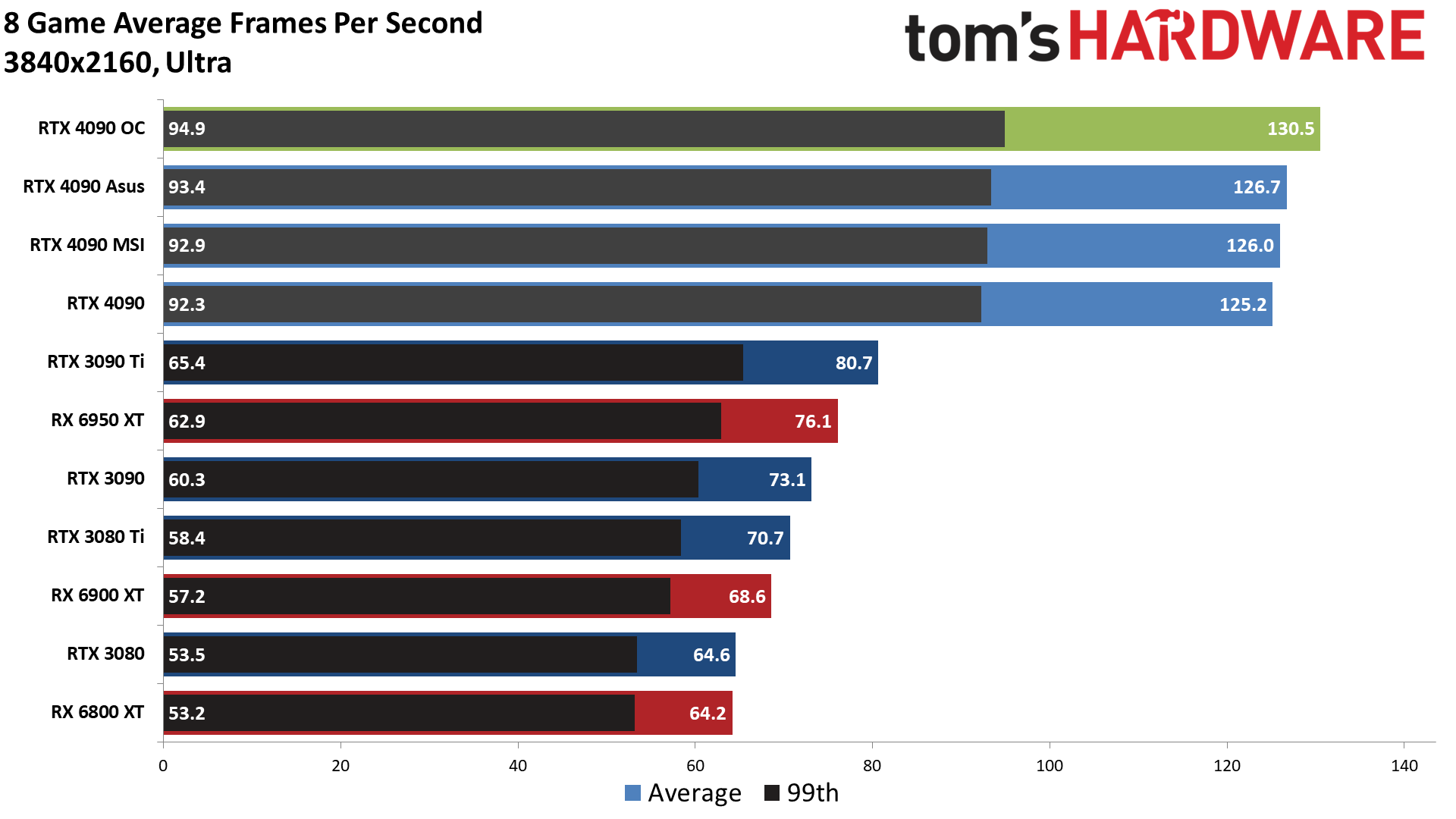
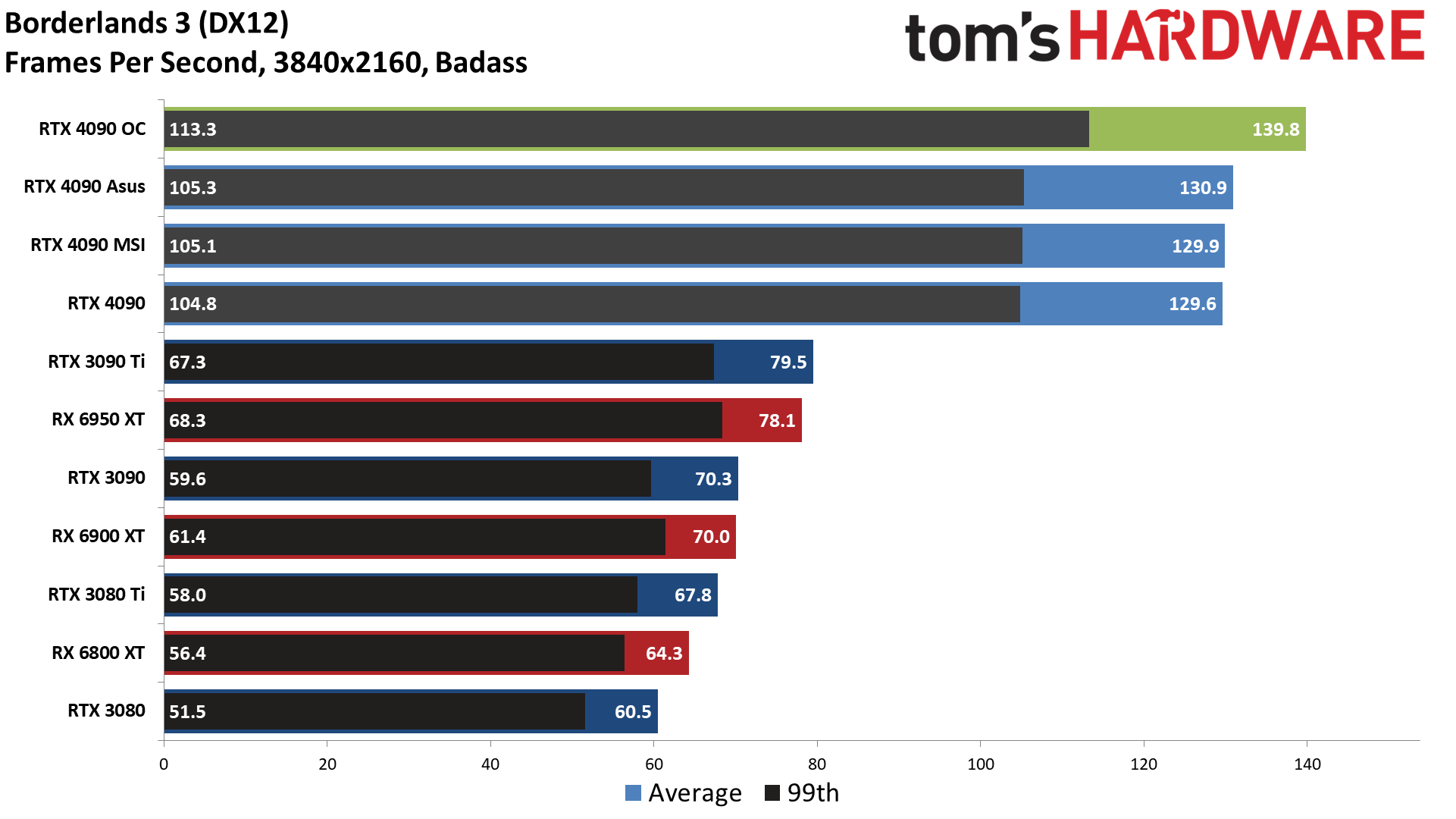
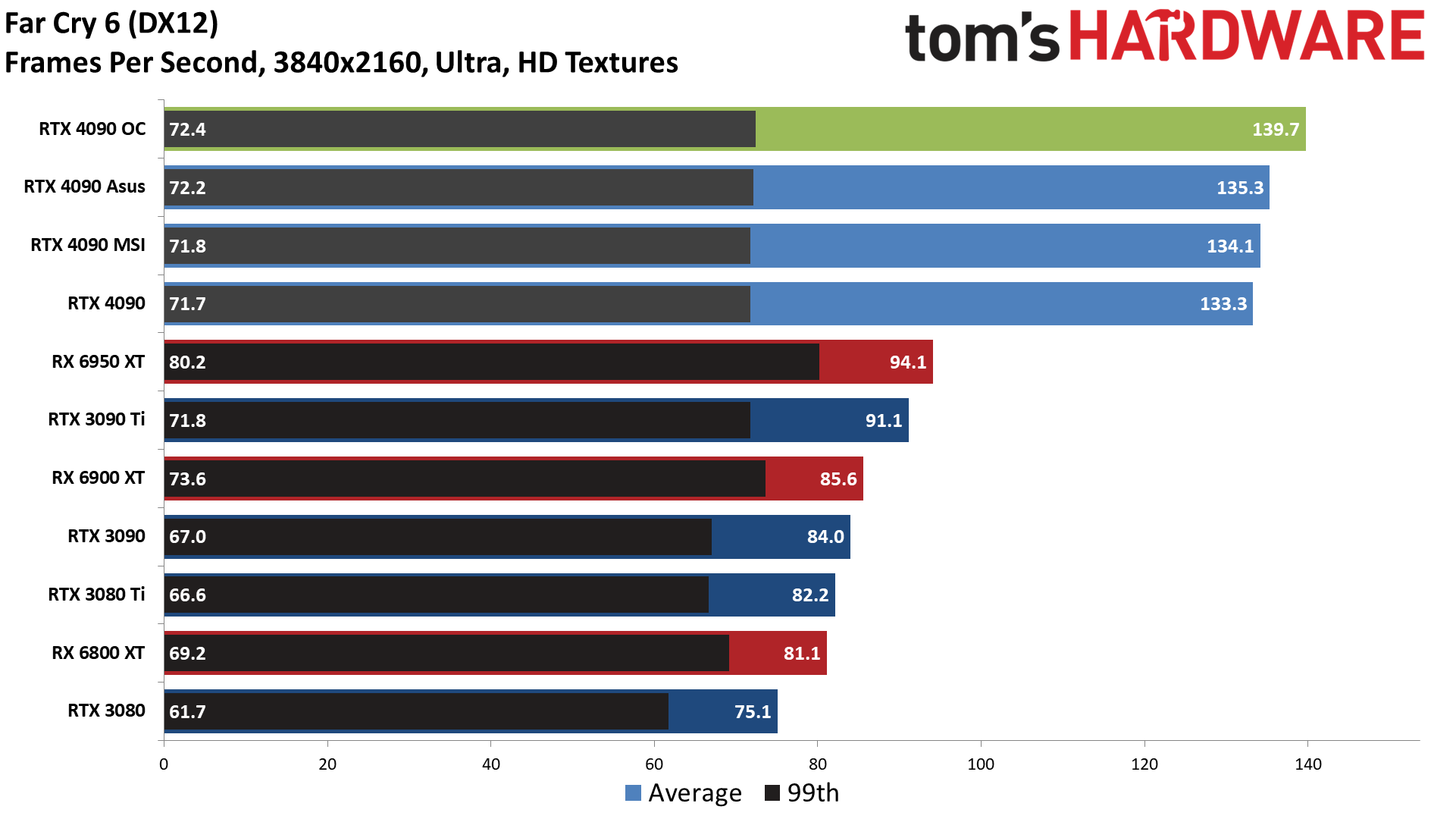
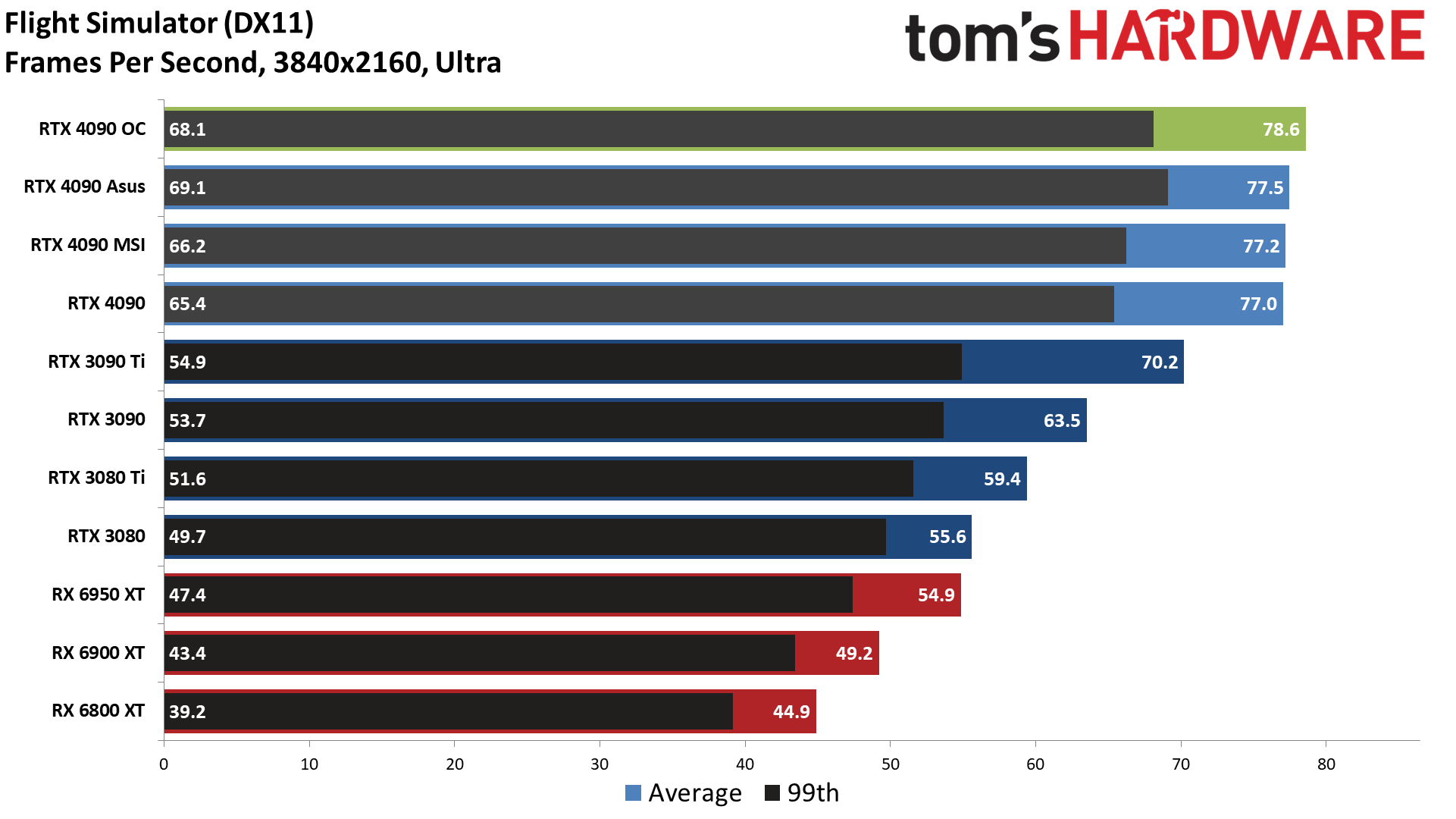
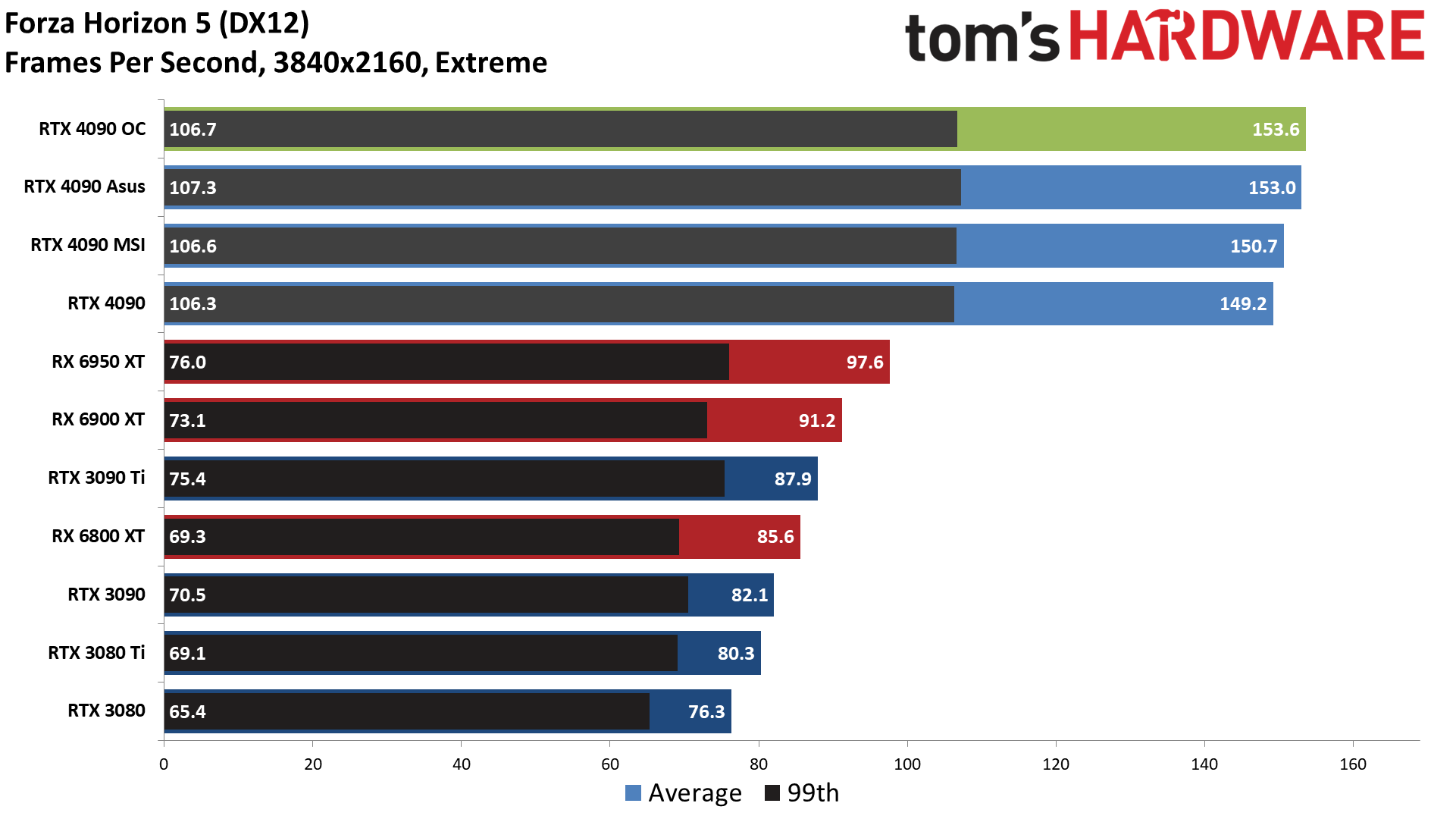
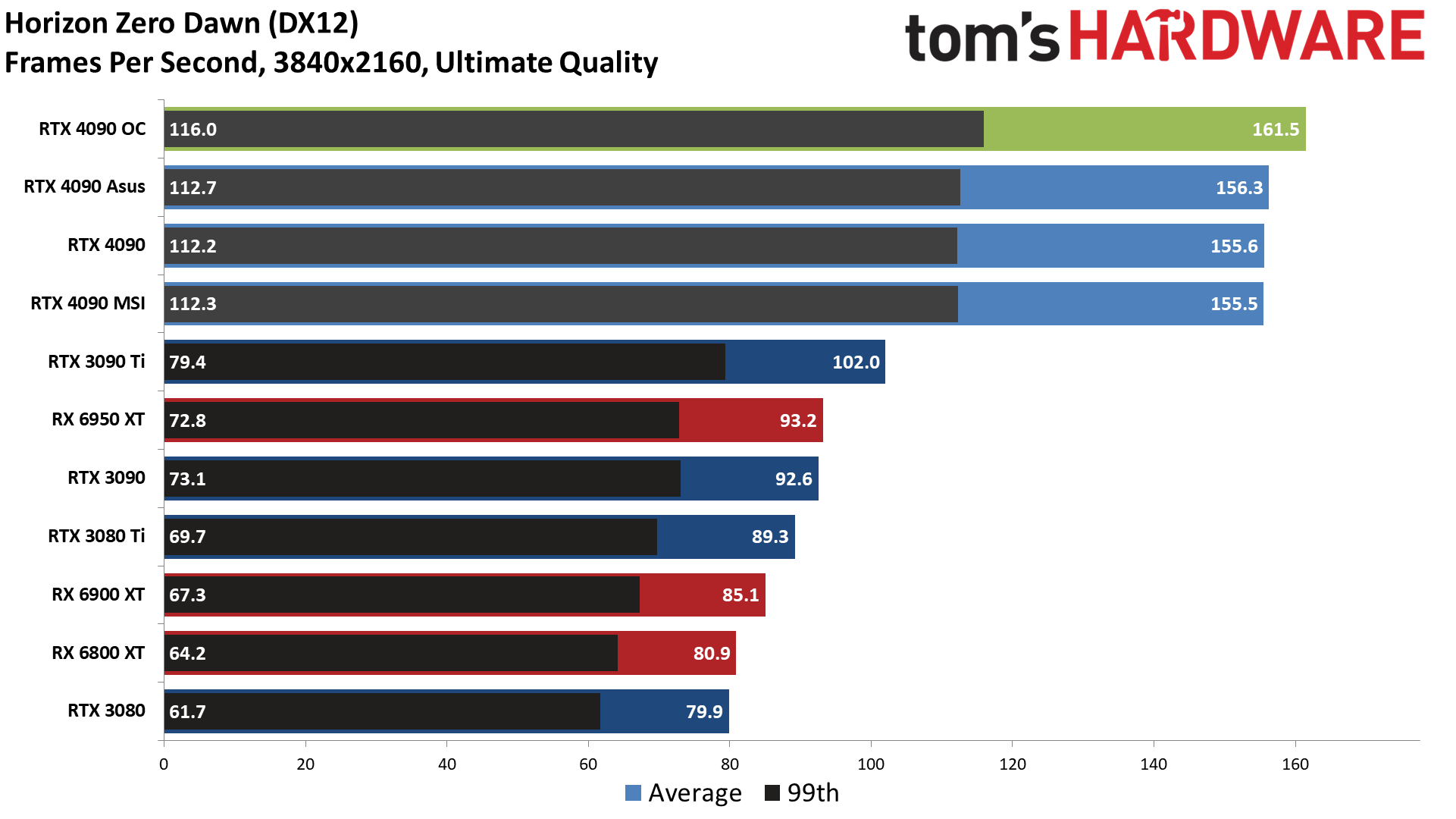
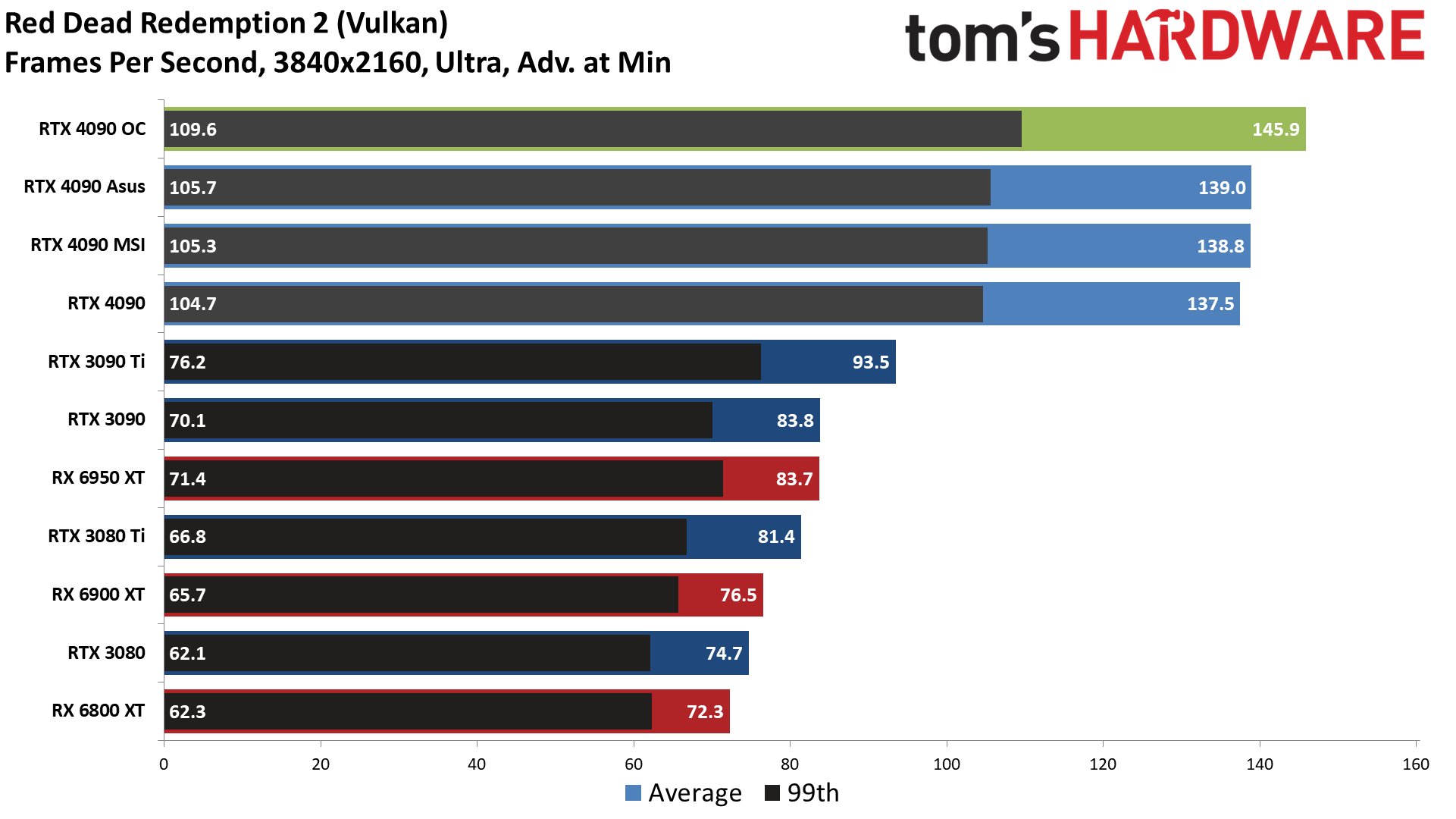
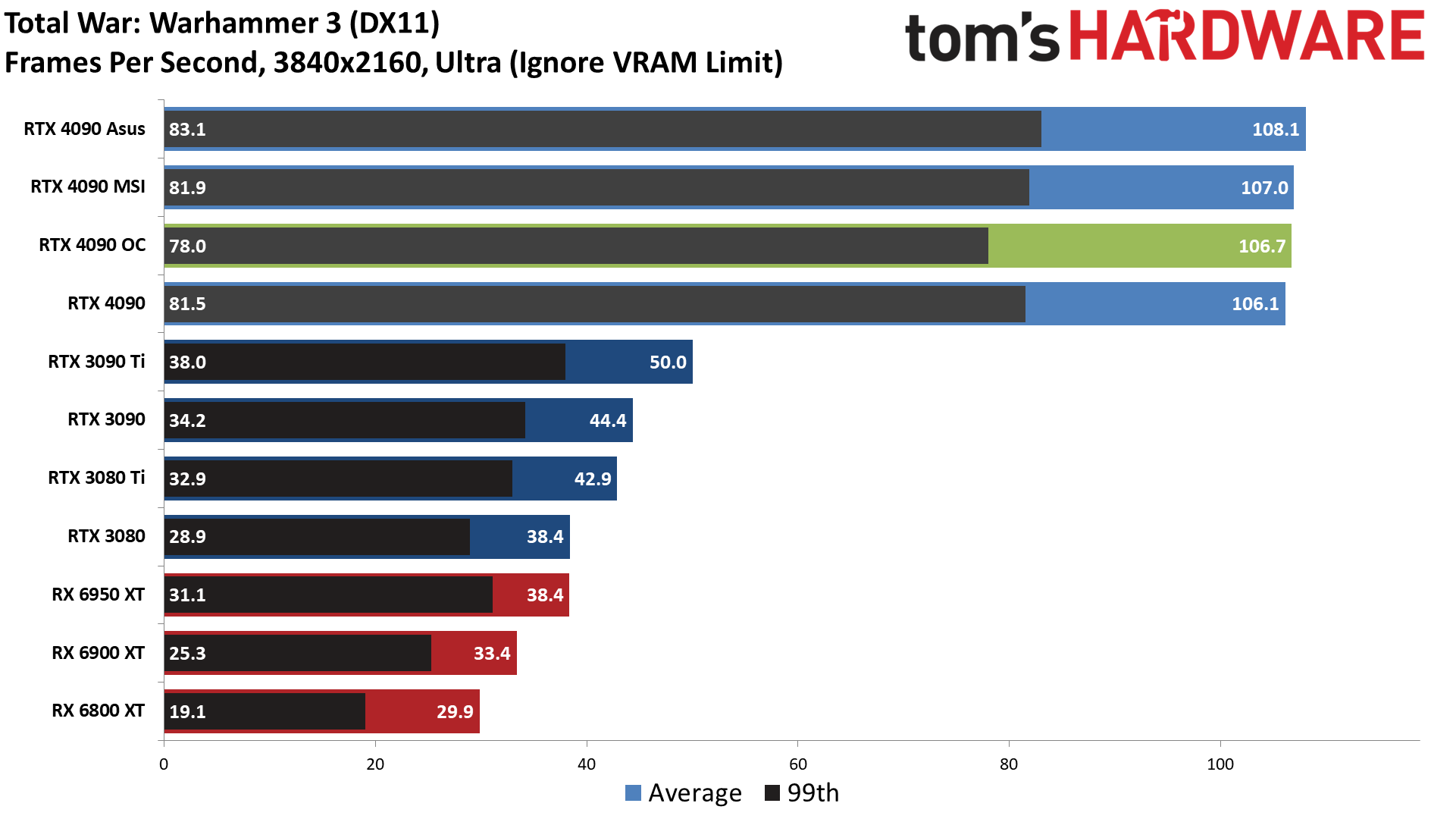
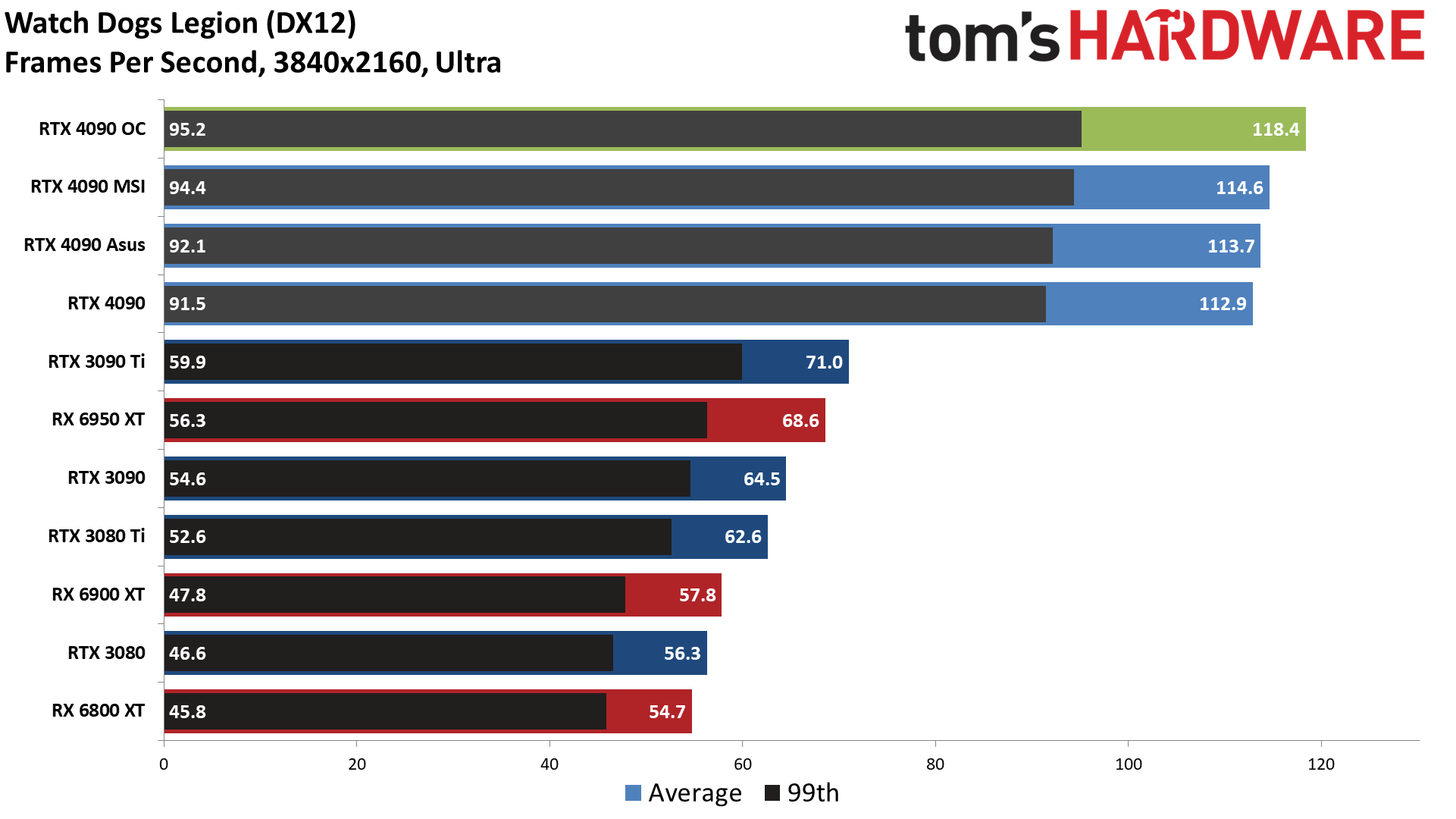
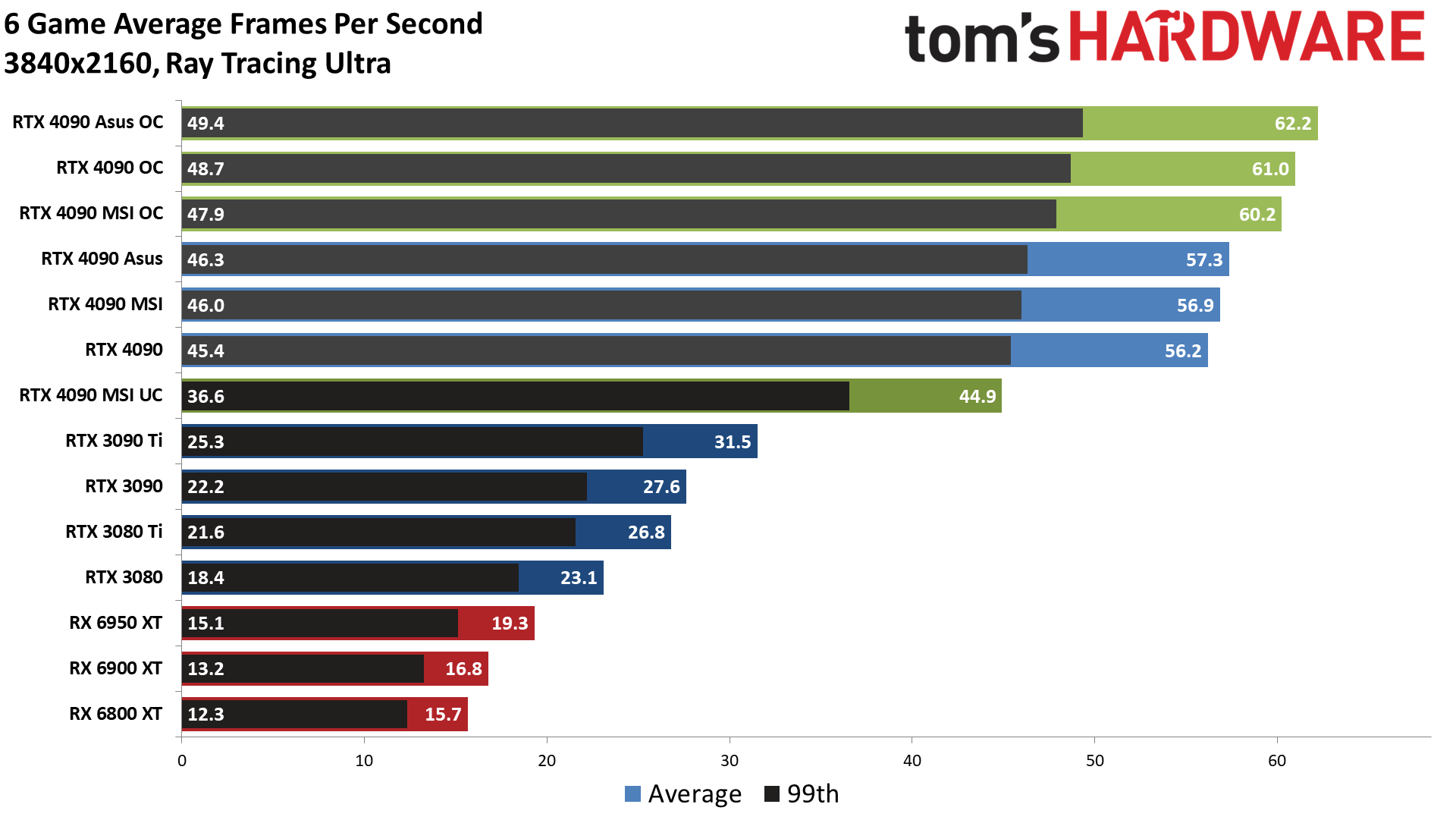
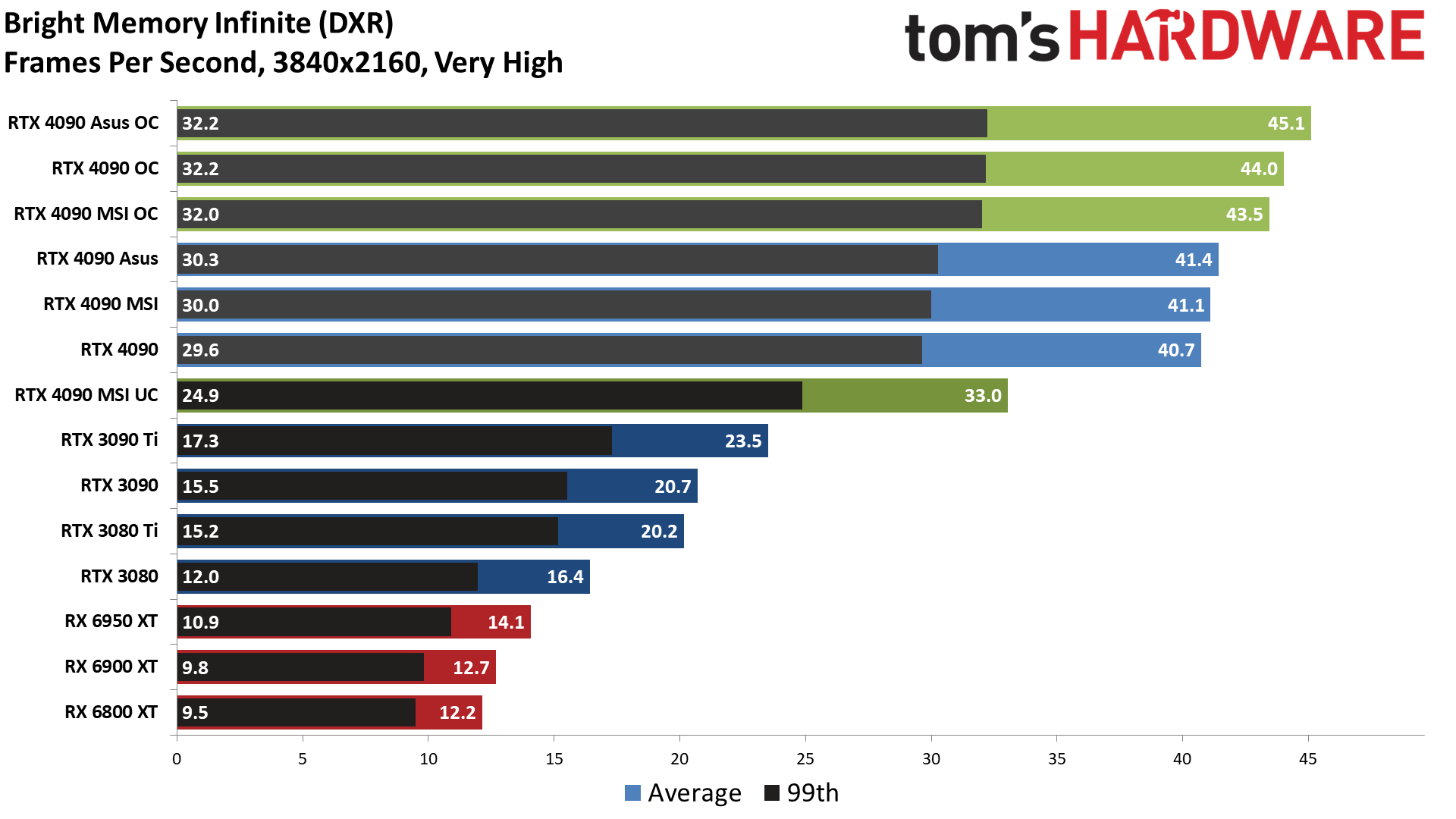
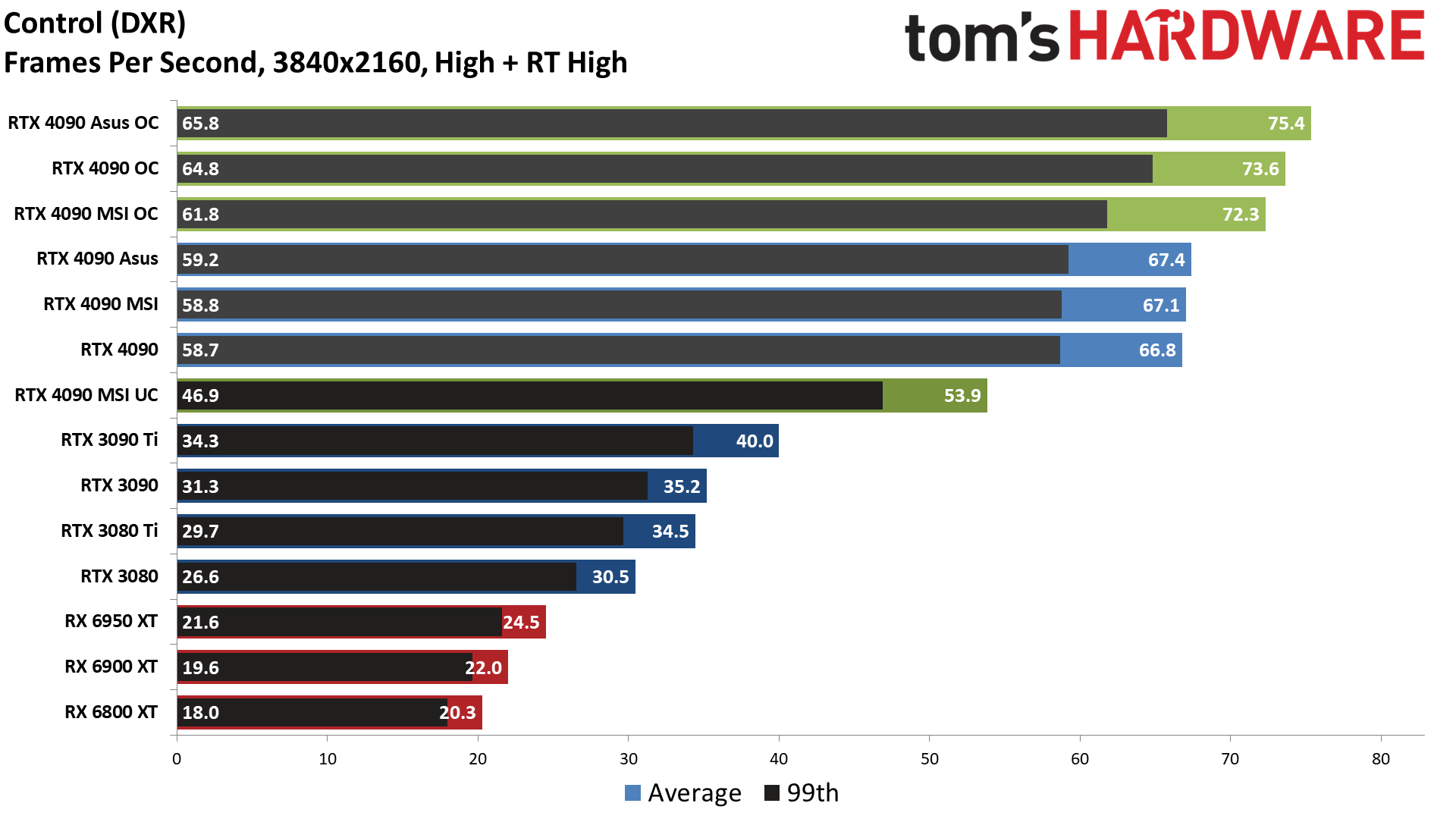
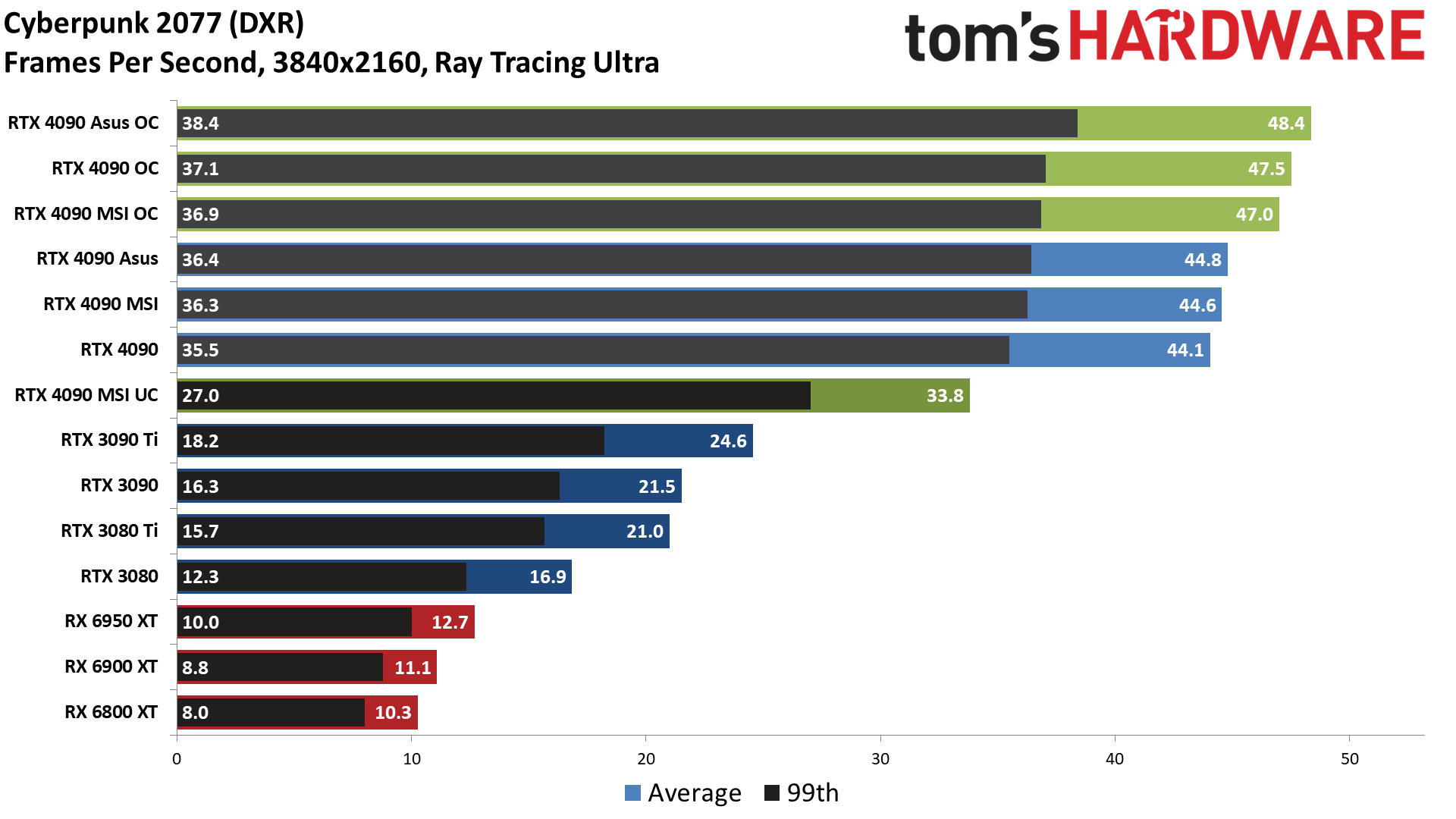
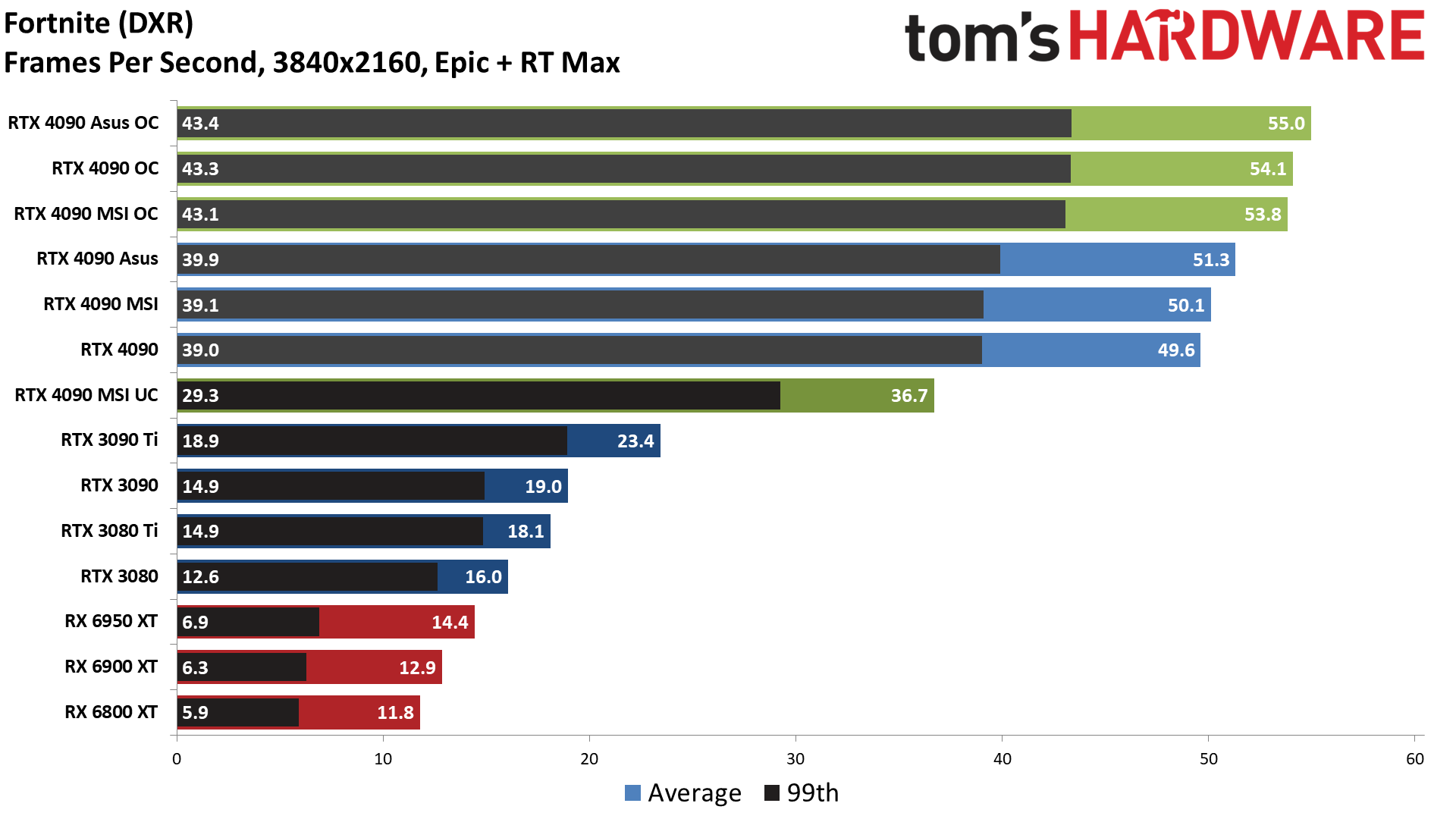
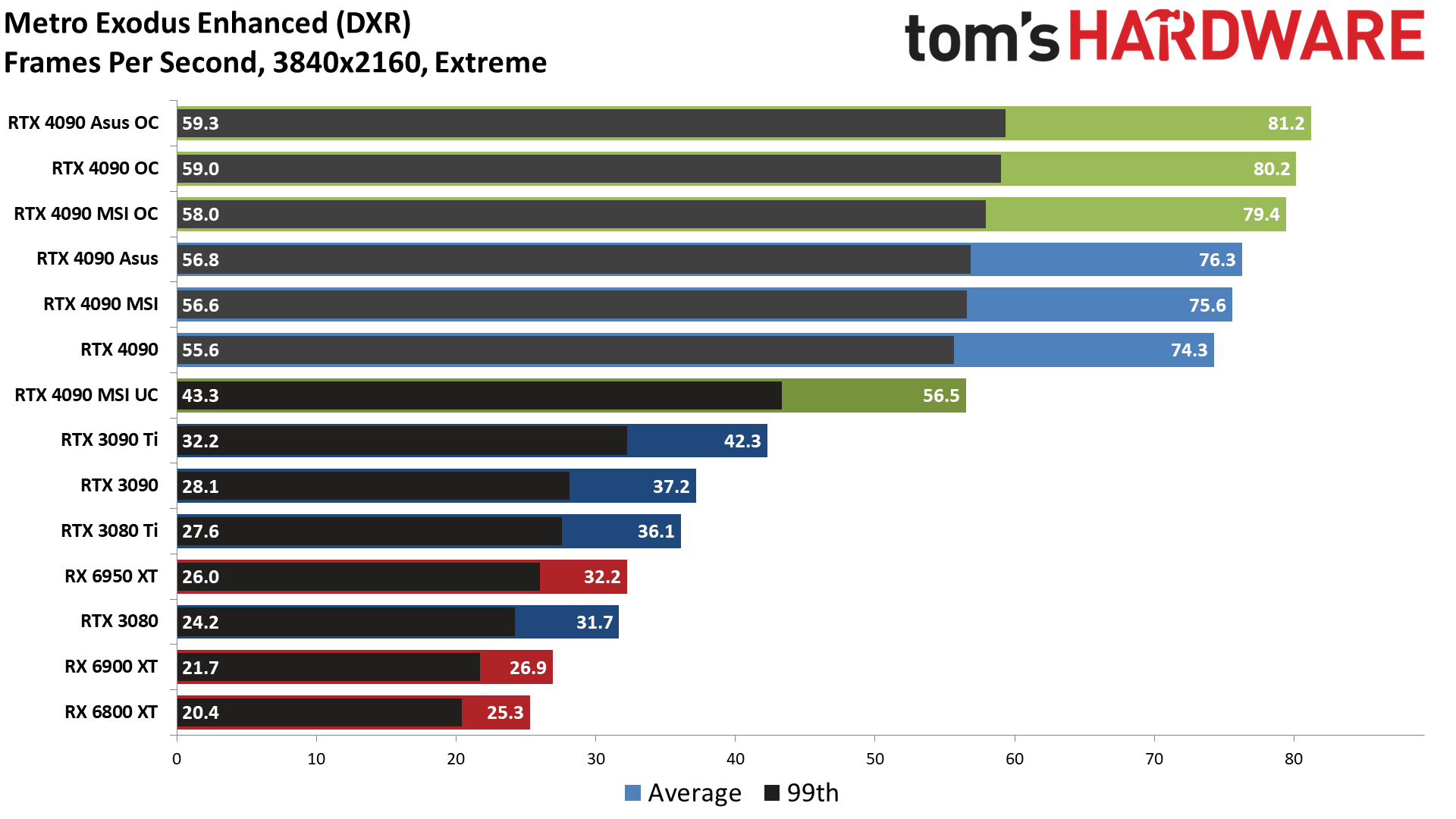
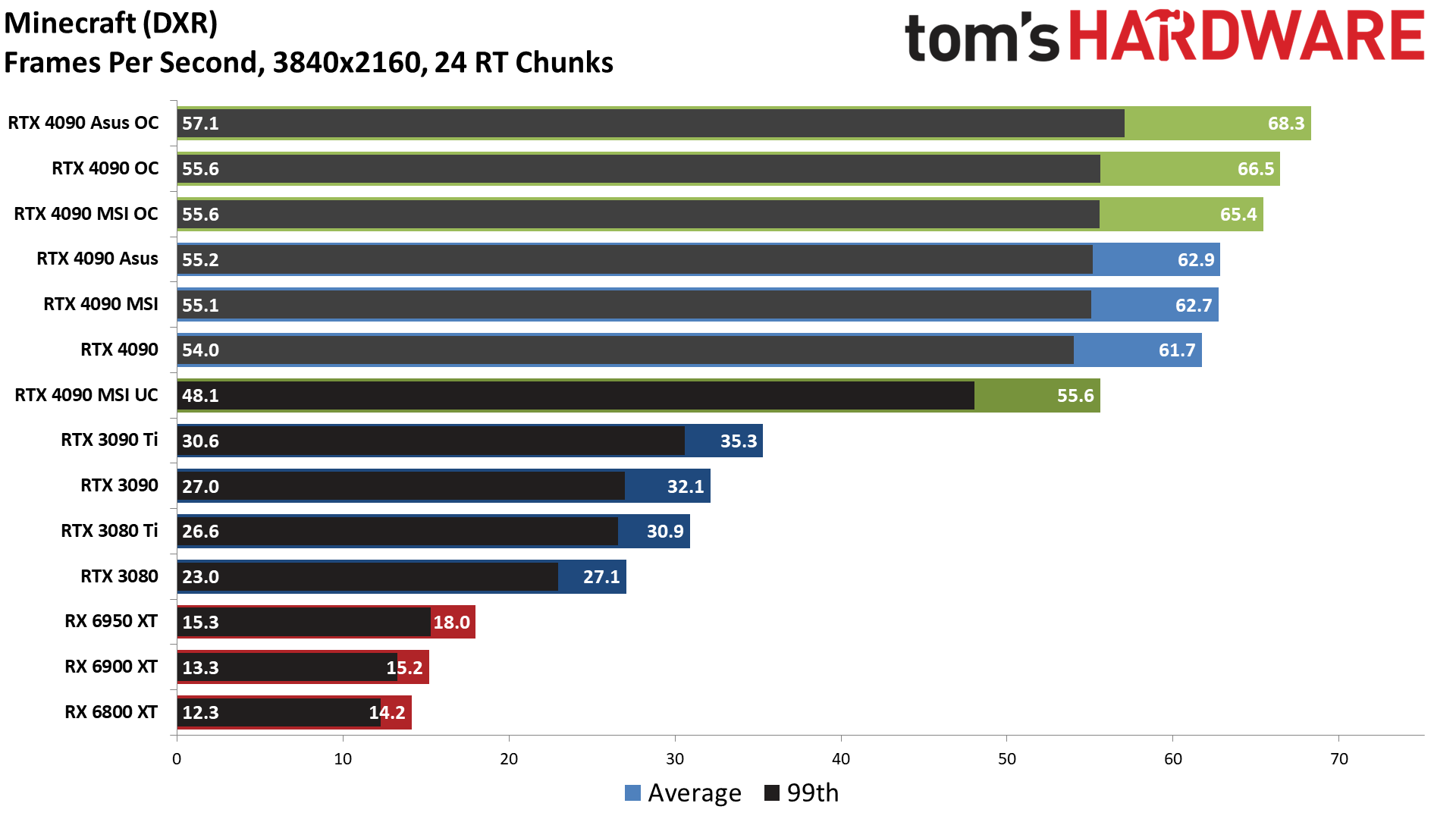
We have both stock and overclocked (and underclocked) results for the ray traced games, while we limited overclocked testing in our standard test suite to the Founders Edition. That's because even at 4K, we start to see other factors limit performance. Across our standard test suite, the overclock on the Founders Edition only improves performance by 4% on average. In our ray tracing suite, the same settings yield an 8.5% improvement.
The MSI 4090 Suprim Liquid X ends up being about 1% faster than the Founders Edition at stock settings, in both the DXR and standard test suites. It's also 1% slower than the Asus ROG Strix card, but we're splitting hairs if we try to make anything of those differences.
Overclocking reveals some interesting bits as well, with the MSI card doing the worst of the three tested 4090 cards. Again, that could be entirely luck of the draw, but we're also not talking major differences as the OC'ed Founders Edition only beats the OC'ed MSI by 1%.
As we've said on numerous occasions, most people are going to be far more interested in cost and aesthetics rather than the potential performance uplift you get from a third-party factory overclocked card. If anything, the 4090 Founders Edition makes the gap between itself and such AIB cards even narrower.
And it doesn't really matter whether you're looking at the overall metric or the individual game results. The spread between the MSI and reference cards ranges from 0% to 1.7%, so all of our testing shows similar potential gains.
1440p Gaming Performance
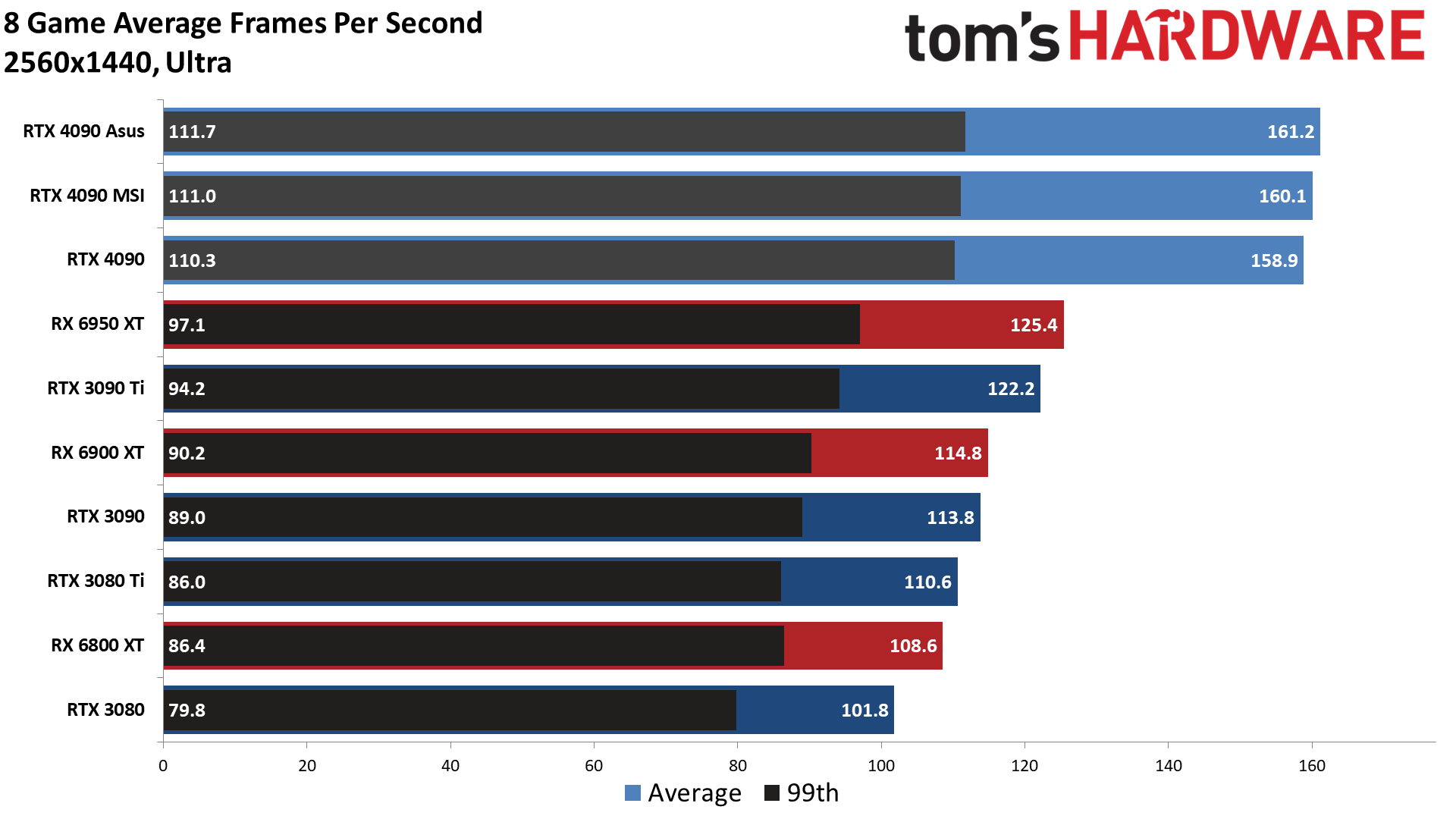
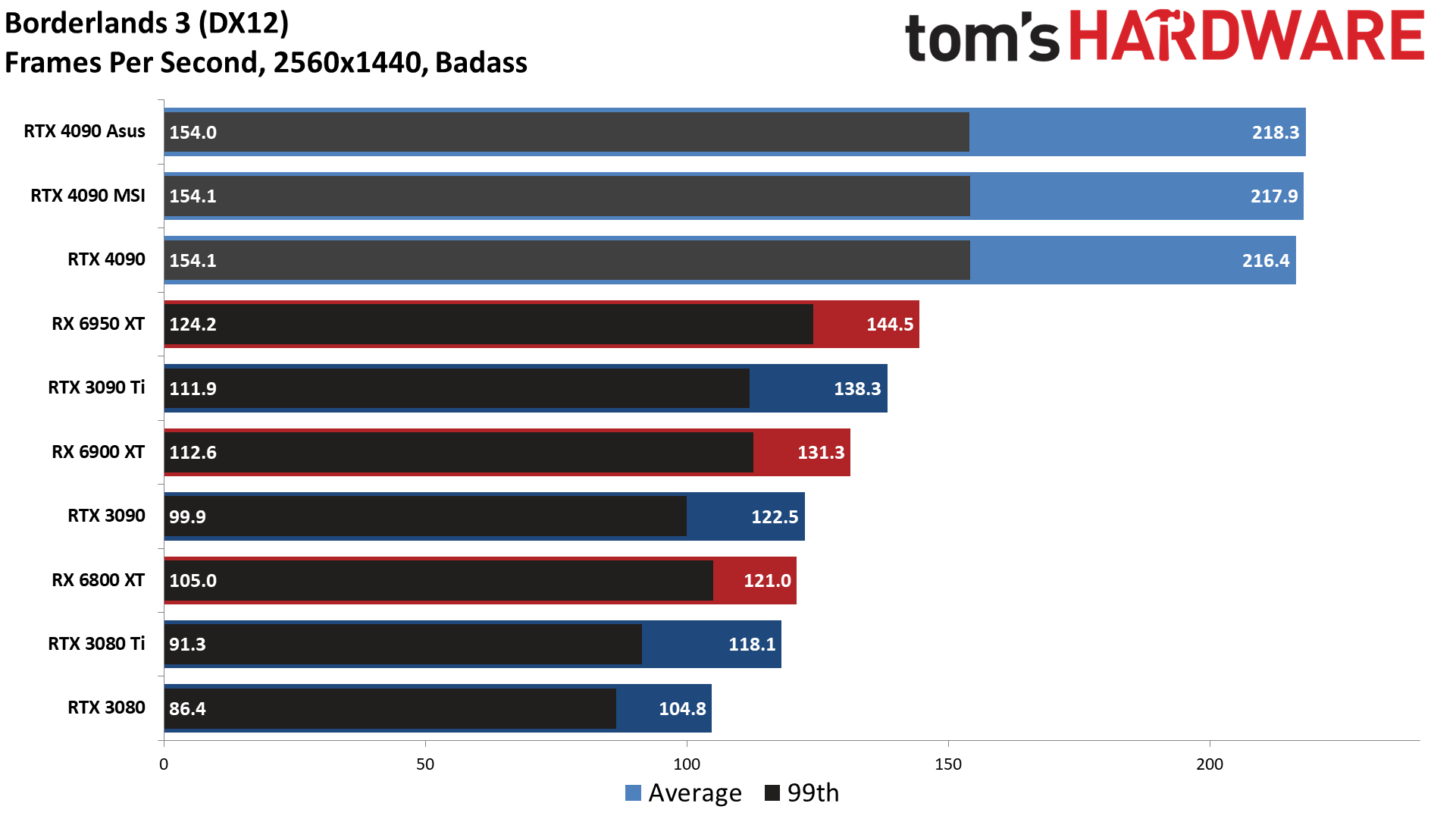
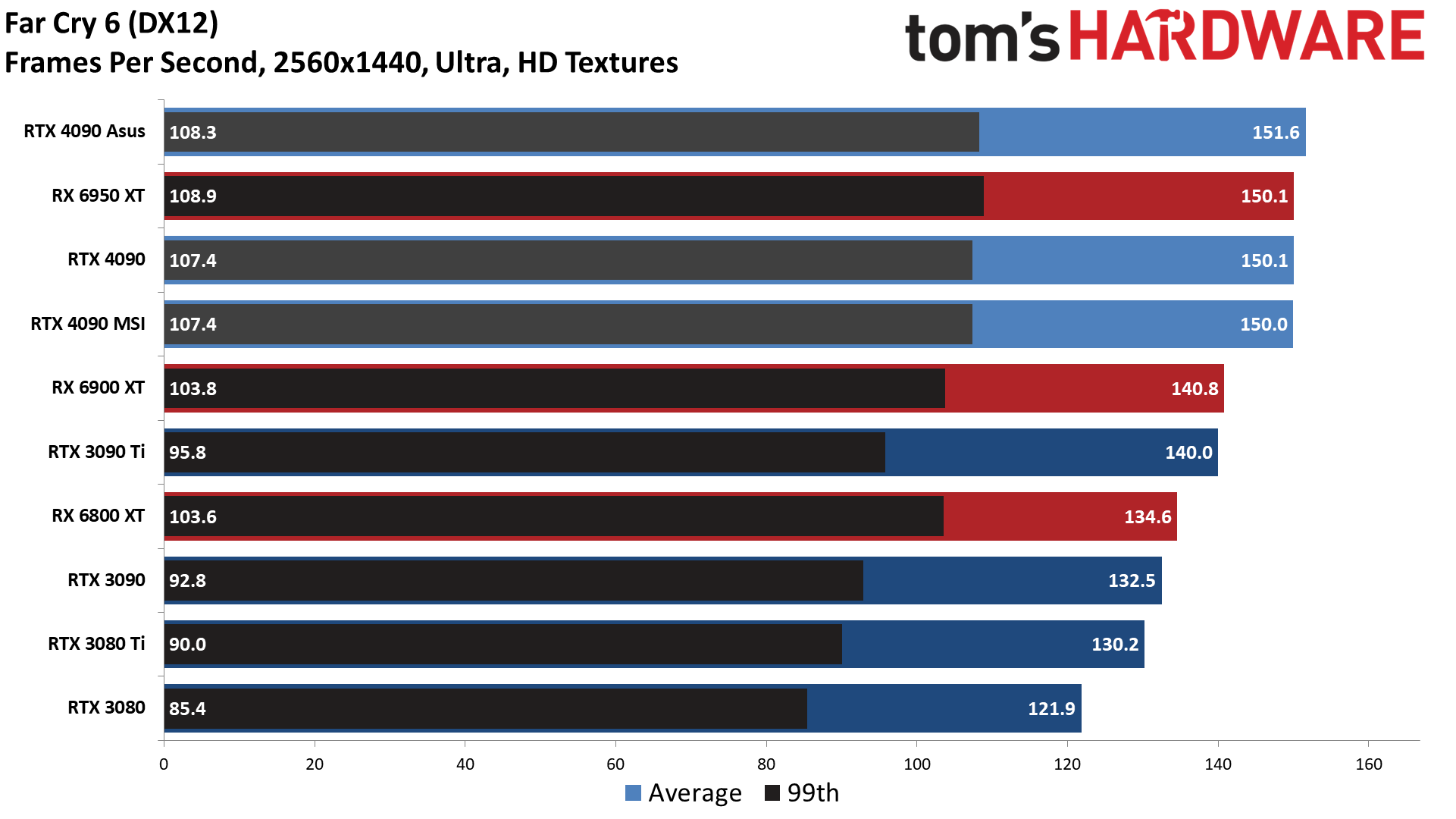
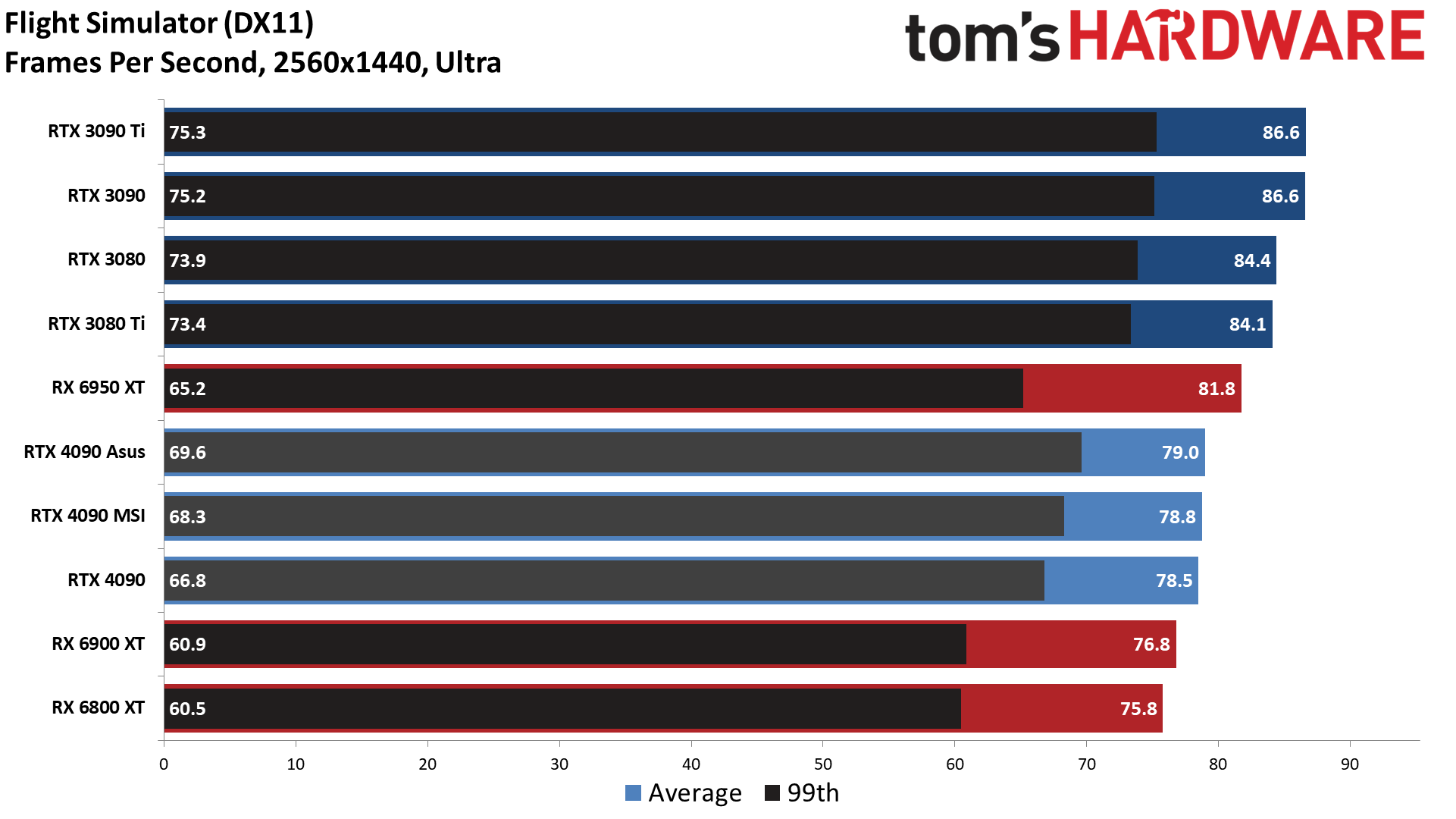
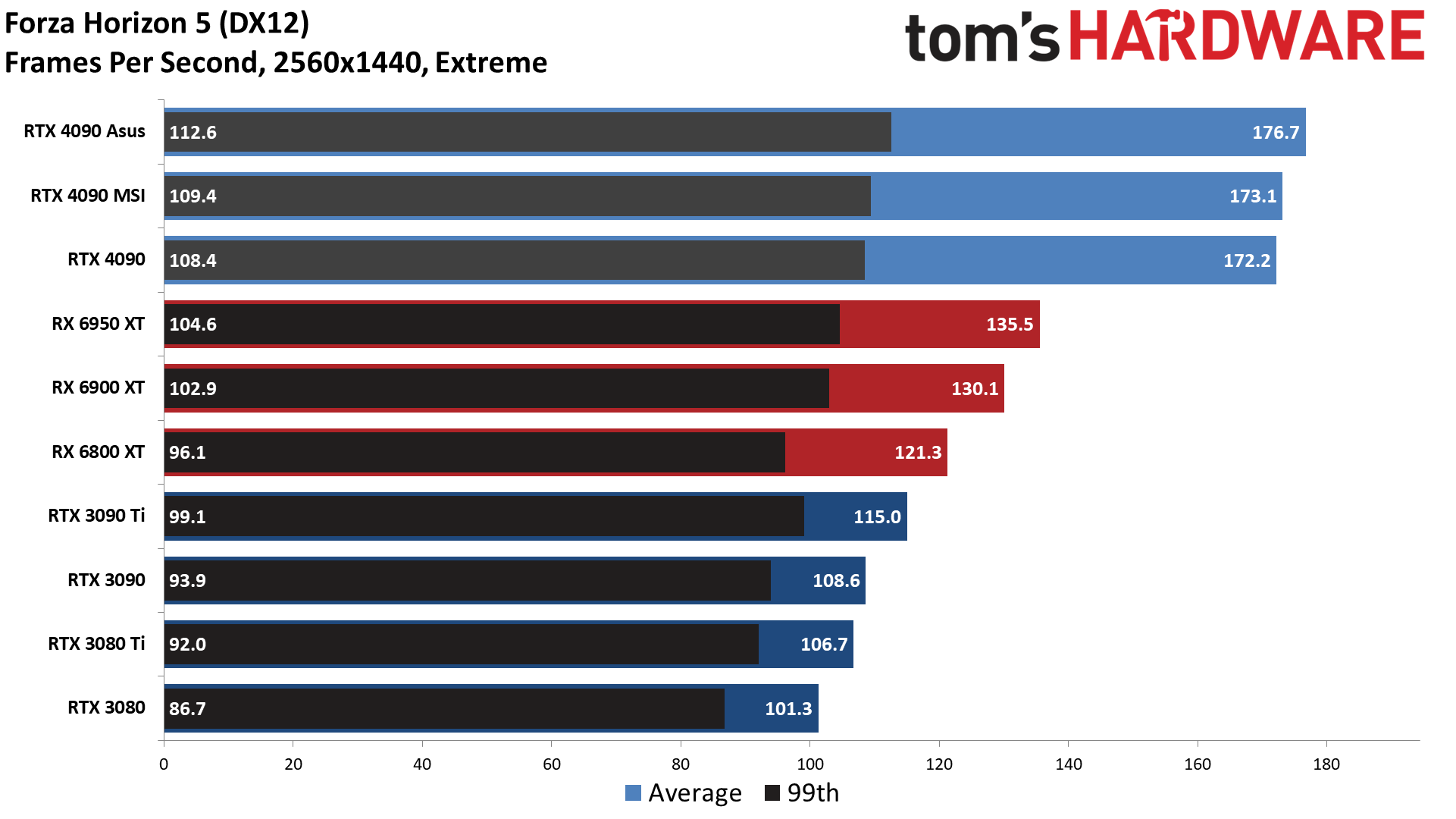
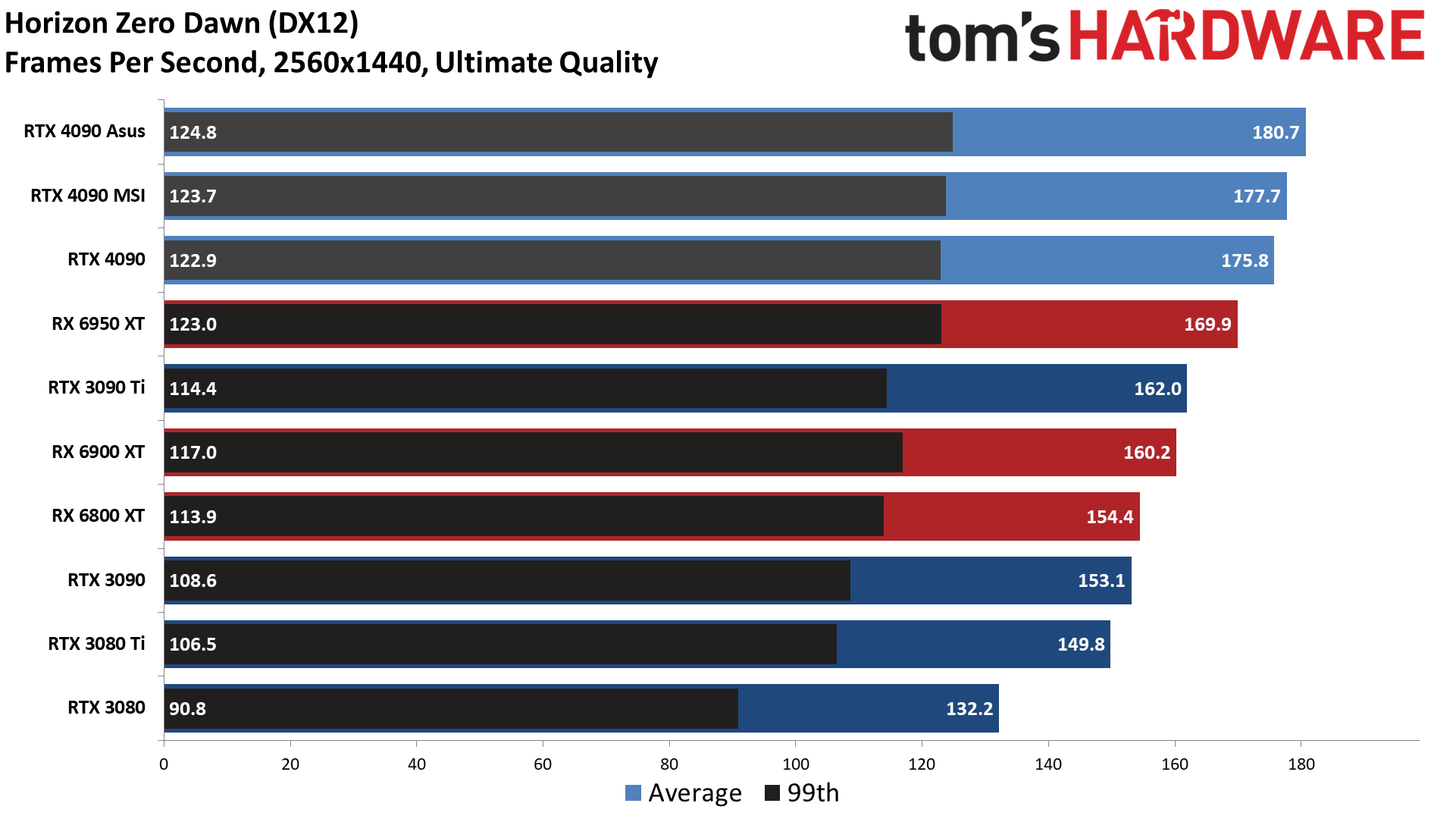
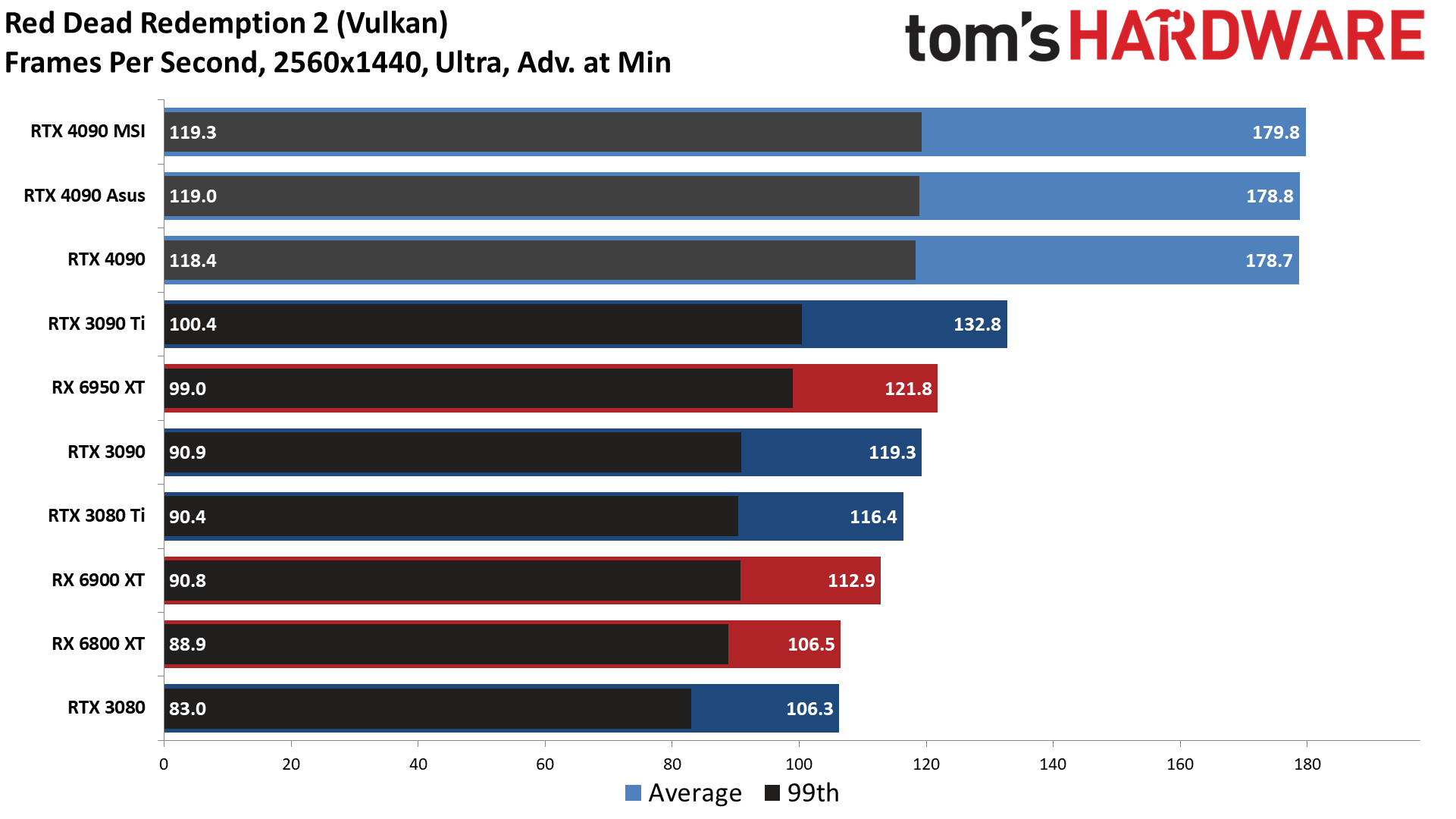
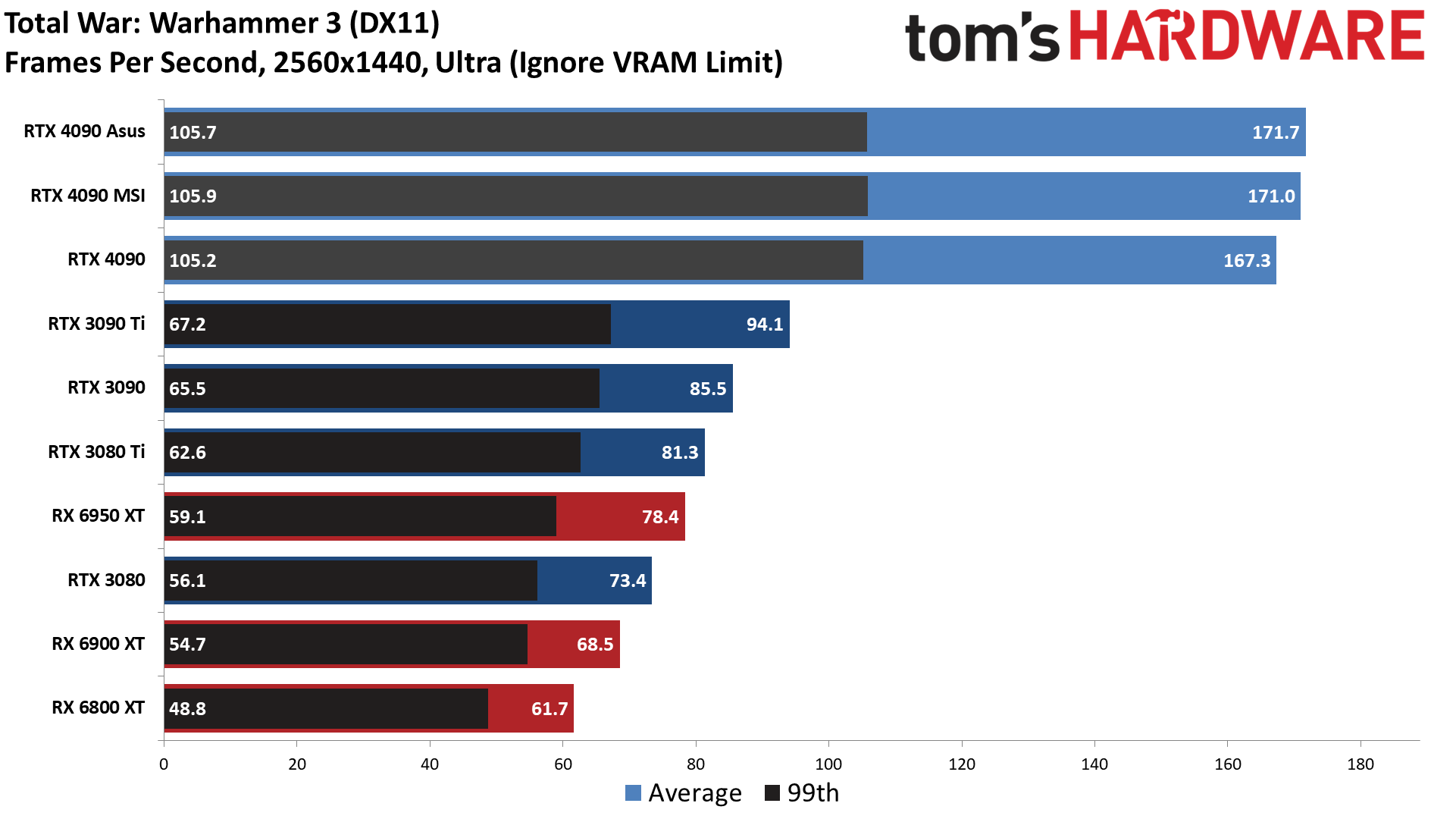
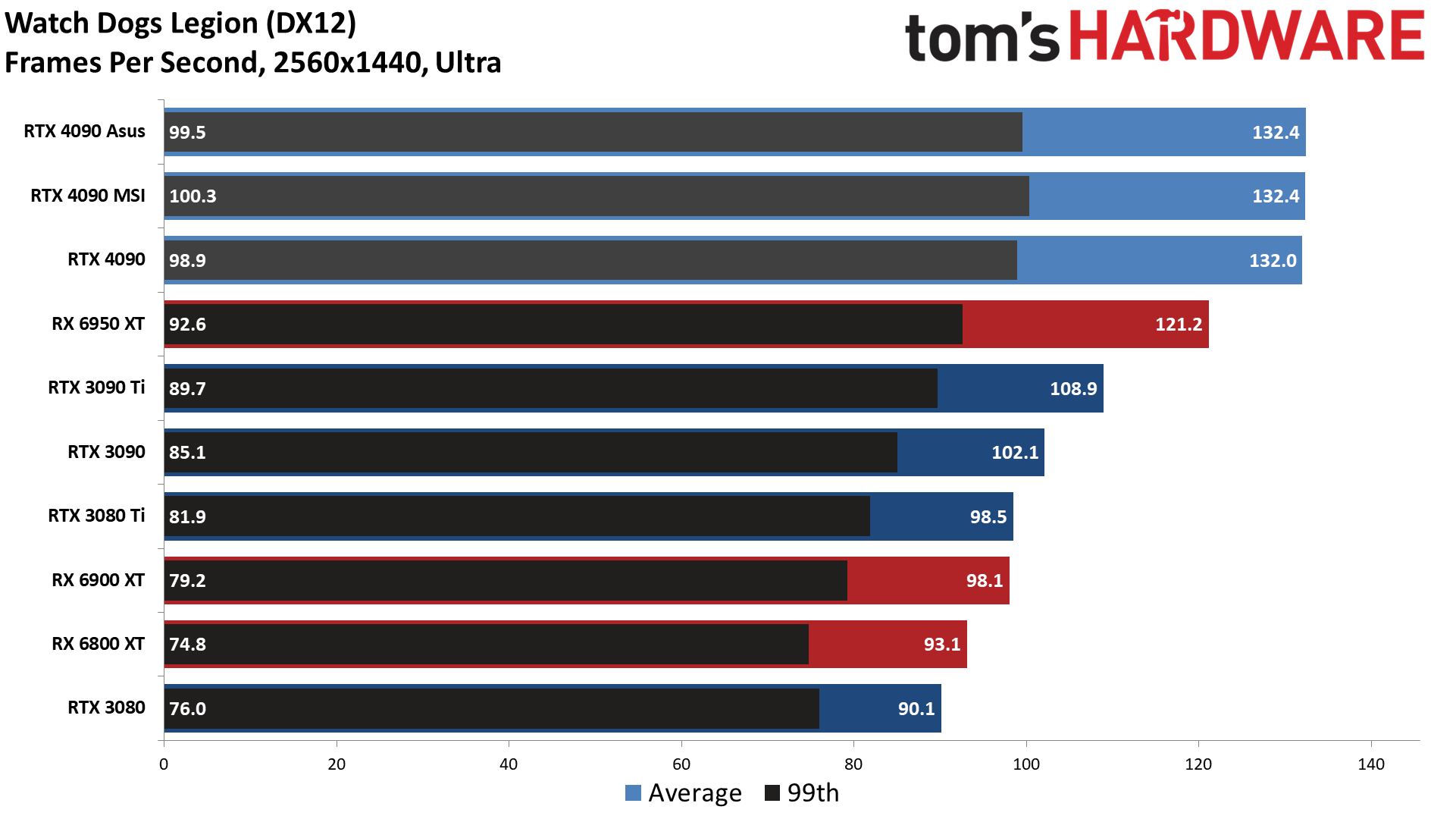
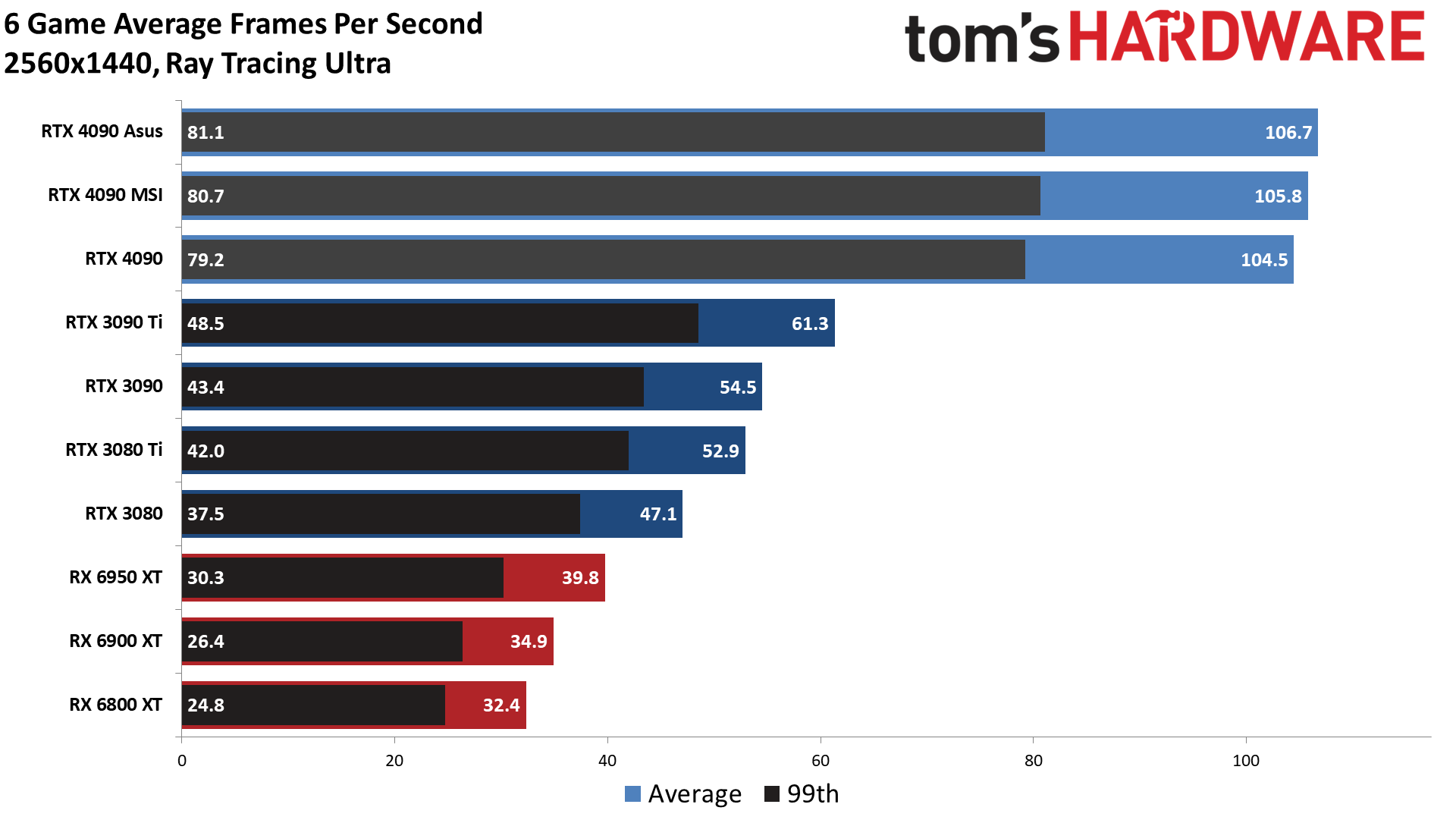
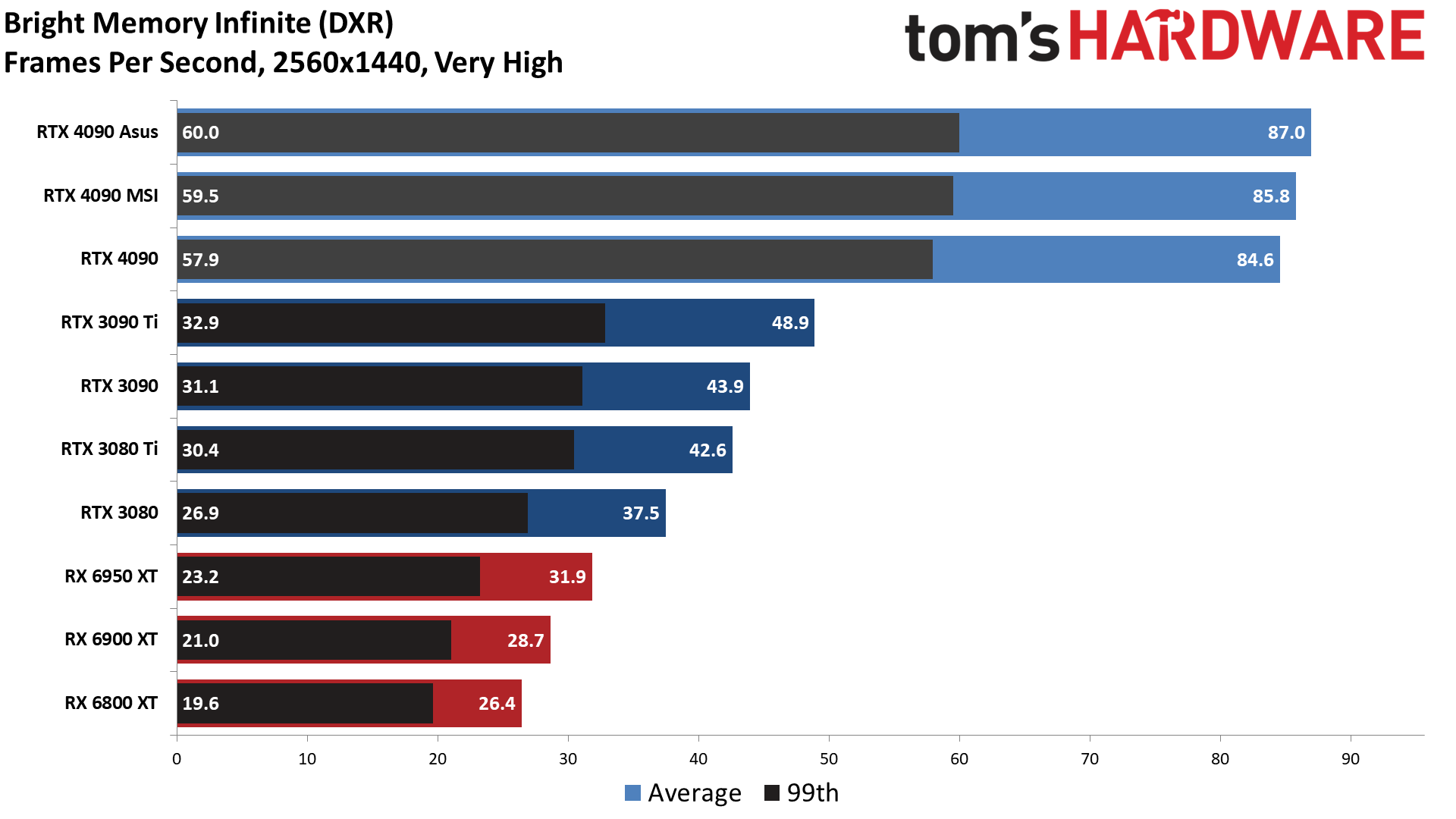
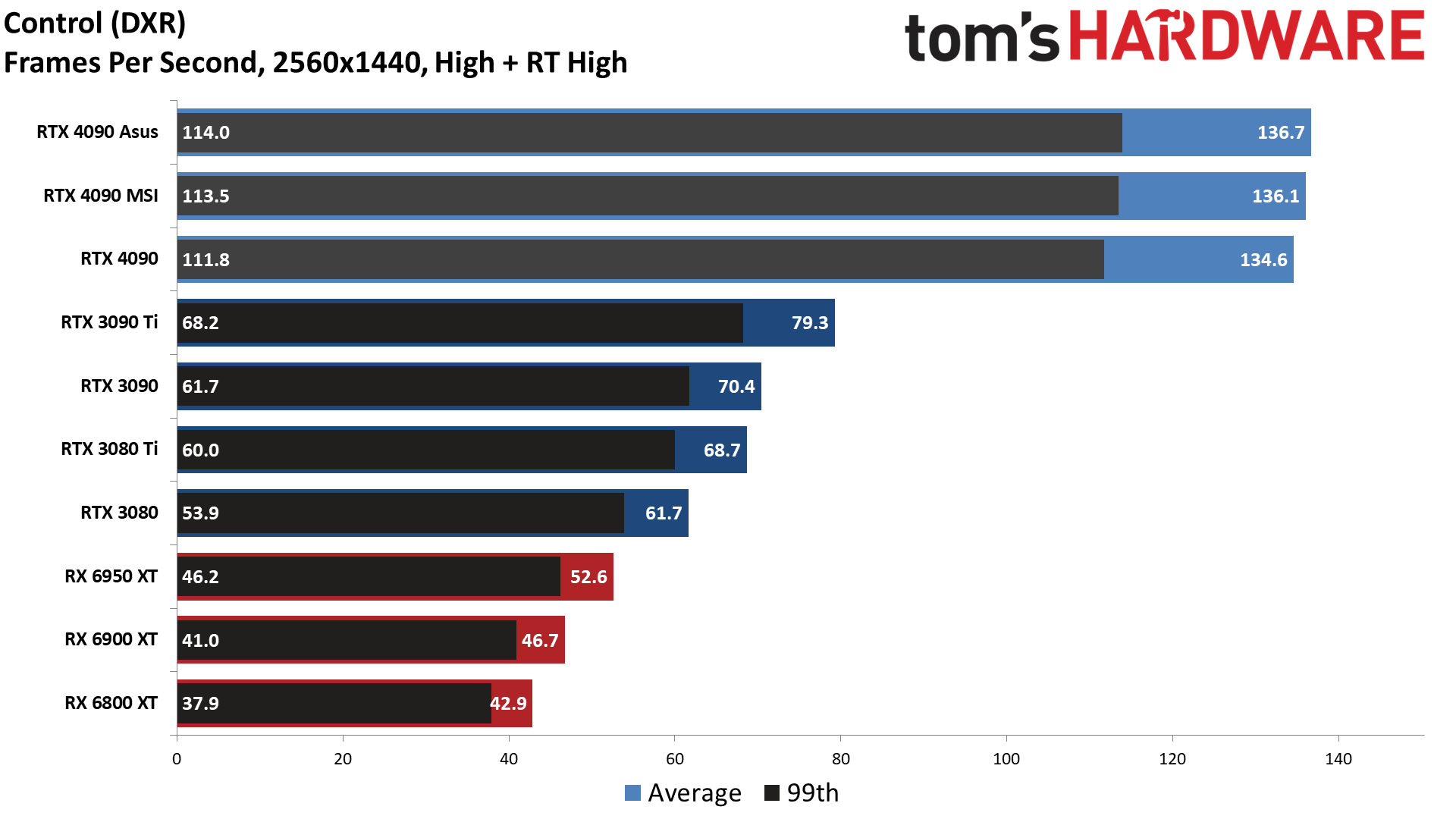
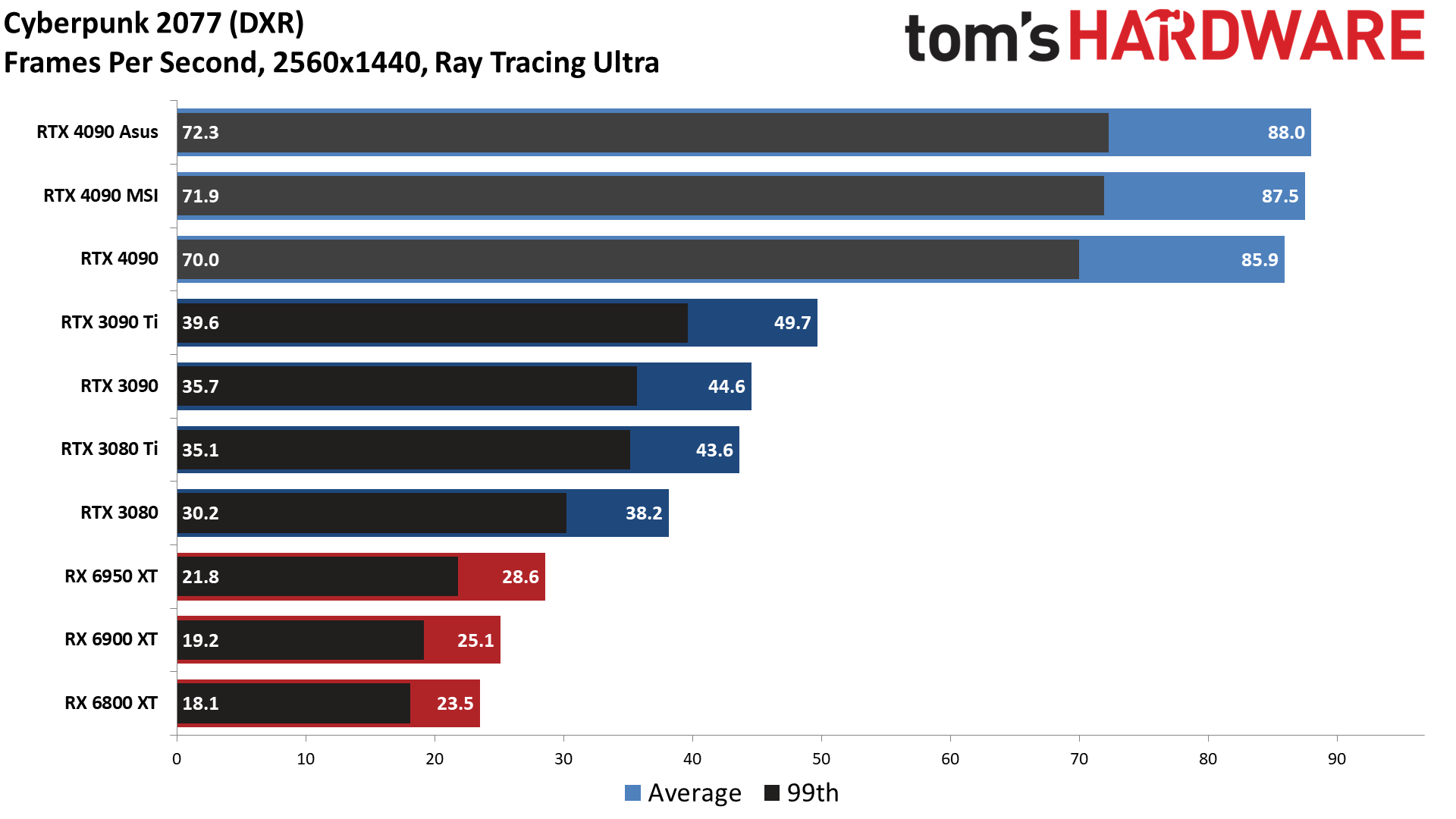
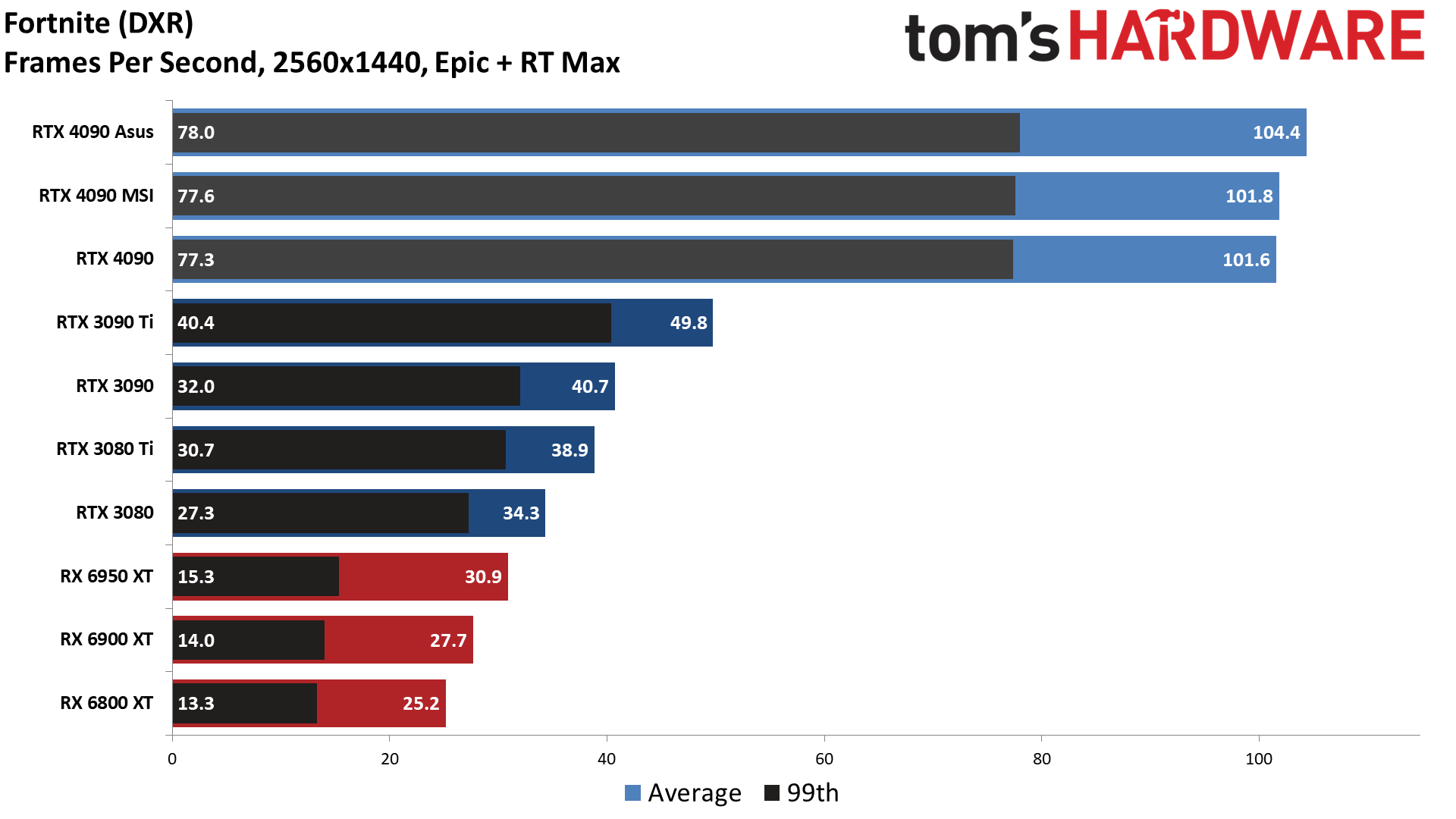
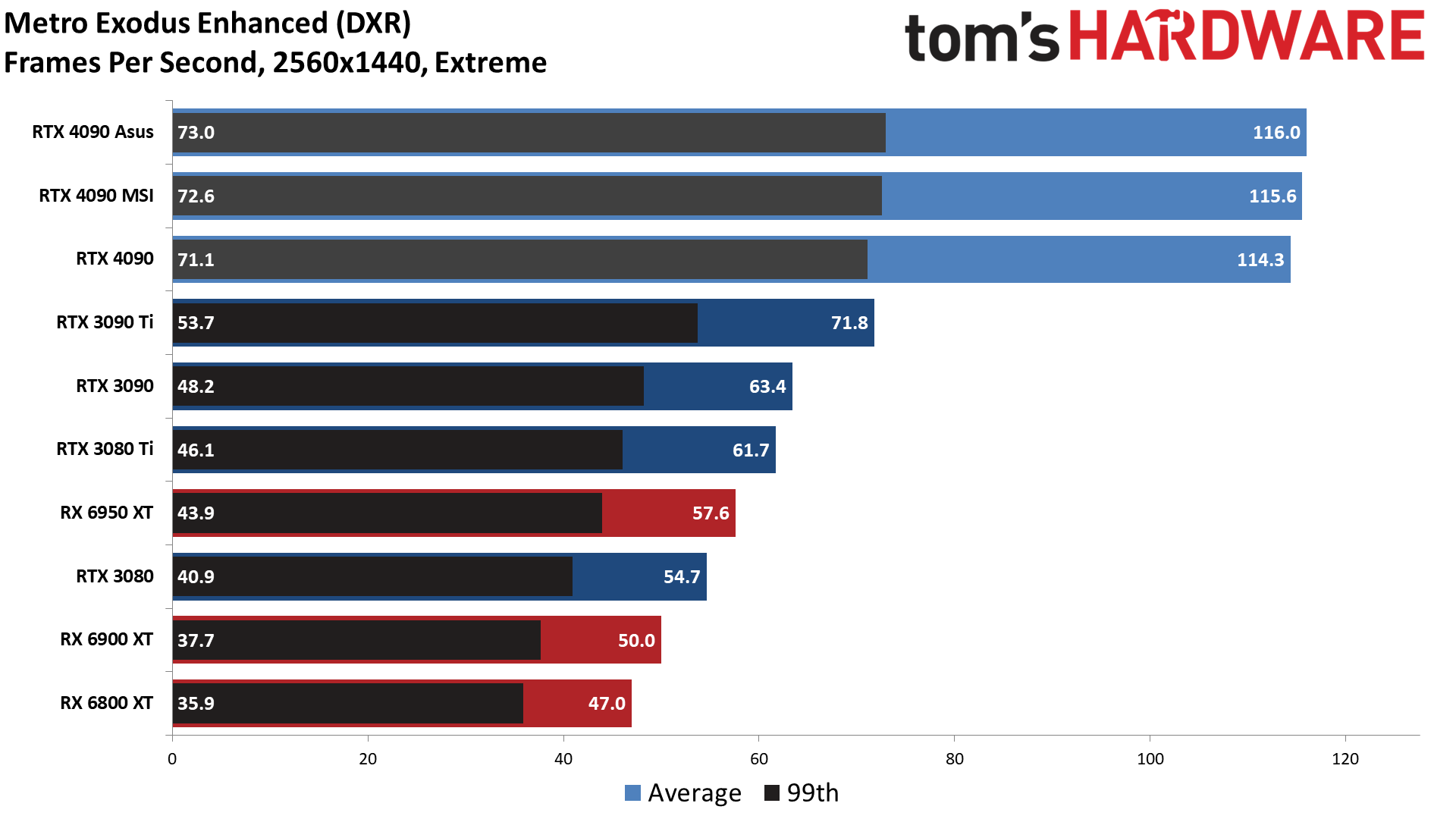
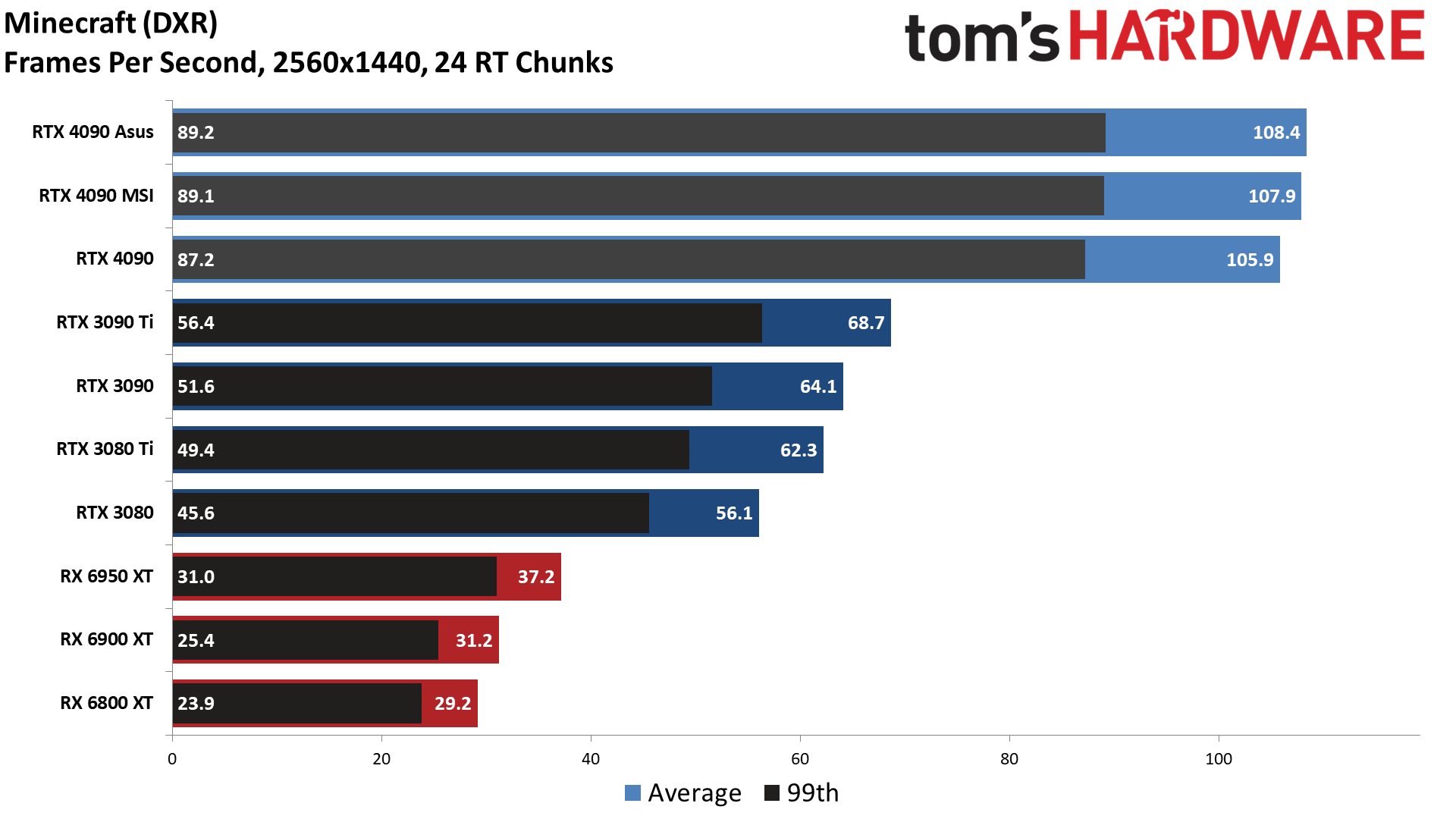
Dropping the resolution to 1440p doesn't change much in terms of standings. The FPS results are a bit higher on the 4090 cards, though it's not as big of a jump as you see with slower cards. That's because our 12900K CPU is holding back performance a bit, particularly in our standard test suite.
Take the MSI card compared to the RX 6950 XT and RTX 3090 Ti as an example. At 1440p, overall performance on the MSI 4090 card improves by 27% compared to 4K. Performance on the RX 6950 XT in contrast increases by 65%, while the RTX 3090 Ti performance improves by 51%.
If we check the same improvements in the DXR suite, the MSI 4090 runs 86% faster at the lower resolution. The RX 6950 XT meanwhile more than doubles, by 106%. The 3090 Ti doesn't improve quite that much, but it's also nearly double the performance, with a 95% increase.
Test Setup for MSI RTX 4090 Suprim Liquid X
We updated our GPU test PC and gaming suite in early 2022, and we'll continue to use the same hardware for a while longer. AMD's Ryzen 9 7950X and the Core i9-13900K are a bit faster, and those would definitely make more of a difference at 1080p. Still, we're using XMP for a modest boost to performance and the GPU generally becomes the limiting factor at 4K — which is where the 4090 belongs.
Our CPU sits in an MSI Pro Z690-A DDR4 WiFi motherboard, with DDR4-3600 memory — a nod to sensibility rather than outright maximum performance. We also upgraded to Windows 11 and are now running the latest 22H2 version (with VBS and HVCI disabled) to ensure we get the most out of Alder Lake. You can see the rest of the hardware in the boxout.
- MORE: Best Graphics Cards
- MORE: GPU Benchmarks and Hierarchy
- MORE: All Graphics Content
Get Tom's Hardware's best news and in-depth reviews, straight to your inbox.
Current page: MSI RTX 4090 Suprim Liquid X: Gaming Performance
Prev Page MSI RTX 4090 Suprim Liquid X Manual Overclocking Next Page MSI RTX 4090 Suprim Liquid X: Power, Temps, Noise, Etc.
Jarred Walton is a senior editor at Tom's Hardware focusing on everything GPU. He has been working as a tech journalist since 2004, writing for AnandTech, Maximum PC, and PC Gamer. From the first S3 Virge '3D decelerators' to today's GPUs, Jarred keeps up with all the latest graphics trends and is the one to ask about game performance.
-
Ltsmba $150 extra for essentially 0 performance gain over the FE 4090. So it takes up a little less space in the case, and looks a little more sleek. I'd probably pay $50 extra for that, but definitely not $150 (more actually for some people who bought it when MSI raised the price even higher temporarily).Reply
I thought the point of a water cooled card was to push the limits of what the GPU could do, but it seems its more of a limitation of how much power you can put into the 4090, not how hot its getting.
Water cooling on these things kinda seems completely overkill, unless i'm missing something, which I might be.
Even if I am missing something, I feel bad for anyone who paid a premium for this card and is getting no boost over the FE 4090... -
Phaaze88 It's technically still a 4-slotter, just split in half, with the 2 halves connected by 470mm long tubes. Depending on how you look at it, it's actually larger than some air cooled models...Reply
Msi seems to have slipped up on the contact pressure, because both Kitguru and Paul's HW show the memory being rather warm...
The cards are hard voltage limited by Nvidia. Previously, they were power limited.Ltsmba said:Water cooling on these things kinda seems completely overkill, unless i'm missing something, which I might be.
Without DIY voltage modding, there isn't much on the table. So AIB models don't offer much more than aesthetics compared to the FE. -
Ltsmba That's good to know that it's a voltage limit rather than a power limit.Reply
I guess even so, it ends up being the same result, no benefit to buying a more expensive AIB model.
It's looking more and more clear why EVGA bailed -
A Stoner While performance wise it might not be a gain, if it reduces actual temperatures, then you will be bleeding less heat into your computer room. Not sure if that is the case here, but I am currently running the same watts on my old newer computer than my older old computer and the newer one causes far less heat buildup in the room. The reason is that the CPU and GPU run at much lower top temperatures than the older ones. I think my CPU tops out at 75 water cooled and the GPU at 92. The older one is 100 CPU water cooled or air cooled and 105 GPU.Reply -
JarredWaltonGPU Reply
I thought I included this, but perhaps not. Across the gaming test suite while manually overclocked, I got a maximum GDDR6X temperature of 82C on the MSI card, I think 78C on the Founders Edition, and 72C on the Asus card. Considering how hot 3090, 3080 Ti, and 3080 cards could get on the memory (100-110C), I find 82C temperatures quite nice and am not particularly worried about them. GPU temps do favor the MSI card over the Founders Edition (57.8C MSI compared to 66.9C on the FE), so by that metric MSI "wins." It's just not a particularly important metric IMO, provided the card runs well under 80C GPU and 90C VRAM.Phaaze88 said:It's technically still a 4-slotter, just split in half, with the 2 halves connected by 470mm long tubes. Depending on how you look at it, it's actually larger than some air cooled models...
MSI seems to have slipped up on the contact pressure, because both Kitguru and Paul's HW show the memory being rather warm. -
Phaaze88 Reply
I'm aware that it's well within spec and not something I'd be worried about either.JarredWaltonGPU said:I thought I included this, but perhaps not. Across the gaming test suite while manually overclocked, I got a maximum GDDR6X temperature of 82C on the MSI card, I think 78C on the Founders Edition, and 72C on the Asus card. Considering how hot 3090, 3080 Ti, and 3080 cards could get on the memory (100-110C), I find 82C temperatures quite nice and am not particularly worried about them. GPU temps do favor the MSI card over the Founders Edition (57.8C MSI compared to 66.9C on the FE), so by that metric MSI "wins." It's just not a particularly important metric IMO, provided the card runs well under 80C GPU and 90C VRAM.
It's just, for a liquid cooled model, one would expect improvements across the board compared to air models, but the Suprim Liquid X fails to accomplish this.
I look at this thing and I'm like, "What's the selling points of this thing? What kind of excuses can I come up with to make this a welcome addition to my PC?"
"That's a clean looking gpu shroud." That's it.
I'd personally just get the FE and customize that. -
PlaneInTheSky ReplyAIO liquid cooling doesn't trump large air coolers
Why would it, air coolers today are liquid coolers. There is liquid in those heat pipes.
Air coolers offer liquid cooling in a perfectly optimized closed heatpipe loop that can't leak, there is nothing that can compete with that. -
pixelpusher220 ReplyPlaneInTheSky said:
Why would it, air coolers today are liquid coolers. There is liquid in those heat pipes.
Air coolers offer liquid cooling in a perfectly optimized closed heatpipe loop that can't leak, there is nothing that can compete with that.
It's not active flow though is it? It's heat driven, and sure there's a lot of it, but that's still not the same as actively pushing a larger volume of liquid through the same surface area. -
JarredWaltonGPU Reply
The reason that's a con is because if liquid cooling isn't better, why should you pay extra for it? It's not a question, it's a statement: AIO liquid cooling generally isn't better than a large air cooler, but it does cost more and it involves a lot more moving parts (in the pump). Also, AIO loops can still lose liquid over time, which means that in 5-10 years these AIO cards may not even work properly. I still have an R9 Fury X kicking around and let me tell you, powering that thing up sounds like the pump is going to kick the bucket and that there's a lot of air in the loop now. Air coolers from the same generation don't have that problem. So yes, the fact that an AIO can't clearly beat air cooling is a many pronged problem that I condensed into a simple statement.PlaneInTheSky said:Why would it, air coolers today are liquid coolers. There is liquid in those heat pipes.
Air coolers offer liquid cooling in a perfectly optimized closed heatpipe loop that can't leak, there is nothing that can compete with that.
